Ahrefs vs Semrush: Which SEO Tool Should You Use
Written by Brian DeanIn collaboration with Semrush

In this post, I’m going to put Semrush and Ahrefs to the test.
So if you’re looking for a DEEP comparison of these two popular SEO tools, you’ve come to the right place.
Because in today’s post I’m going to compare Semrush vs. Ahrefs in terms of:
- Keyword research features
- Backlink analysis
- Technical SEO tools
- Pricing and value
- Unique features
- And lots more
Let’s do this!
Introducing: The Two Competitors
In the blue corner, we have Semrush.
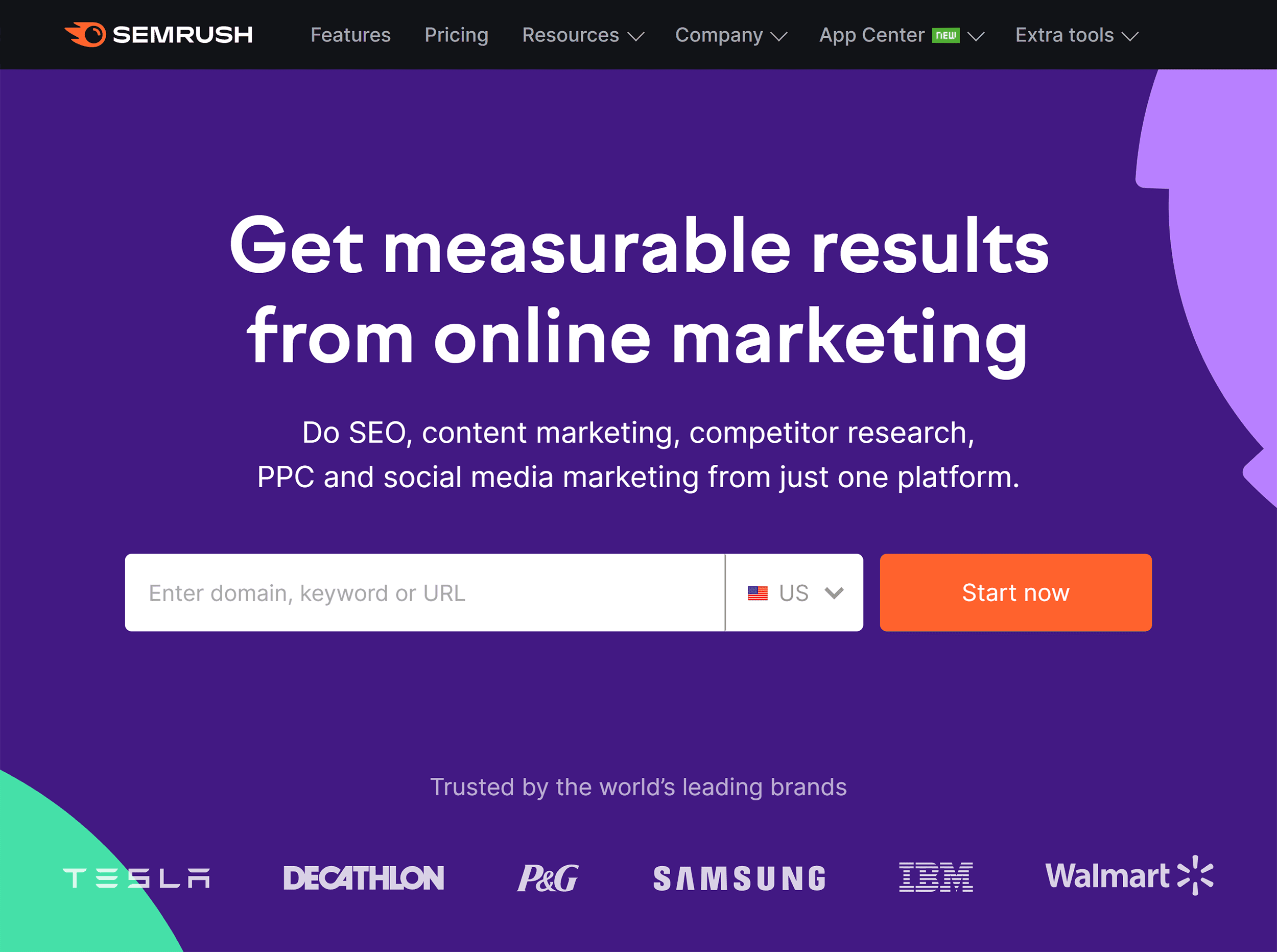
Semrush is a fully-functional digital marketing software suite. Although they do focus on SEO (especially keyword research).
As you’ll soon see, Ahrefs also has a number of non-SEO features too. And we’ll compare the two later.
But it’s important to know that Semrush started as an SEO tool, which is still where their focus is.
In fact, today, you can use Semrush to:
- Optimize your content for SEO
- Analyze competitor SEO and PPC campaigns
- Reverse engineer a site’s top traffic sources
- Analyze log files
- Lots more
In the red corner, we have Ahrefs.

Ahrefs is best known as a backlink analysis tool. But over the last few years they’ve added A TON of new features.

Which is why it’s even possible to do an Semrush vs. Ahrefs comparison. A few years ago Ahrefs was 100% focused on links.
Today, Ahrefs has a ton of features that make it a direct competitor to Semrush, including:
- Keyword research features
- Keyword competitor analysis
- Technical SEO tools (like a site audit feature)
- Rank tracking
The bottom line is that Ahrefs and Semrush have similar feature sets.
So it’s time to answer the key question: which SEO tool is the best overall?
Let’s get started.
Which Tool Is Best for SEO Keyword Research?
First, I decided to see which tool was best for finding new keywords.
Let’s see who came out on top.
Semrush
With Semrush, you can see all of the keywords that a competing site currently ranks for.

On the surface, this feature is similar to the one in Ahrefs, with some minor differences.
(For example, they have different ways of estimating how much organic traffic a site gets from their first page rankings.)
The unique thing about Semrush here is that you get A LOT more in-depth keyword data in this report, plus their AI-powered features give you even more information to make better decisions.

Ahrefs basically shows you search volume, CPC and competition. But Semrush shows you A TON of data on each term, like the search volume trend and number of results.
Semrush’s Keyword Overview tool gives you deeper, more actionable insights. By adding a layer of personalization and analytical precision powered by AI, you can better align with your specific SEO goals.
For example, Topical Authority checks how authoritative your domain is on certain topics, helping you pinpoint where you can shine in search rankings.
It analyzes content quality and relevance, helping to predict how well your content will perform in search engine rankings.

Another great metric is Personal Keyword Difficulty (PKD %).
It gives you customized keyword difficulty scores for your domain, making them more relevant to your specific situation. This means you can pick out domain-specific keyword opportunities that are easier to rank for.

Also, the Domain Competitive Power metric measures your domain’s ability to rank for specific keywords compared to the competition.
It supports the keyword research process by clearly showing where you stand against competitors and identifying areas where you can potentially dominate.

Semrush also has a traditional keyword research tool.
Like most keyword tools, you can see that keyword’s search volume and competition.

And get a list of keyword suggestions based on what you typed in.

What also makes Semrush’s keyword research feature unique is you also get data from Google PPC.

So if you’re an in-house SEO or run an agency, you’re probably doing SEO and running Google Ads campaigns at the same time.
And having SEO and PPC data at your fingertips can be SUPER helpful.
Ahrefs
Ahrefs has two main keyword research features:
- Keyword Explorer
- Organic keywords
Let’s see how each one works.
Keyword Explorer is like most other keyword tools on the market.
Type in a keyword. And get a list of ideas for target keywords.
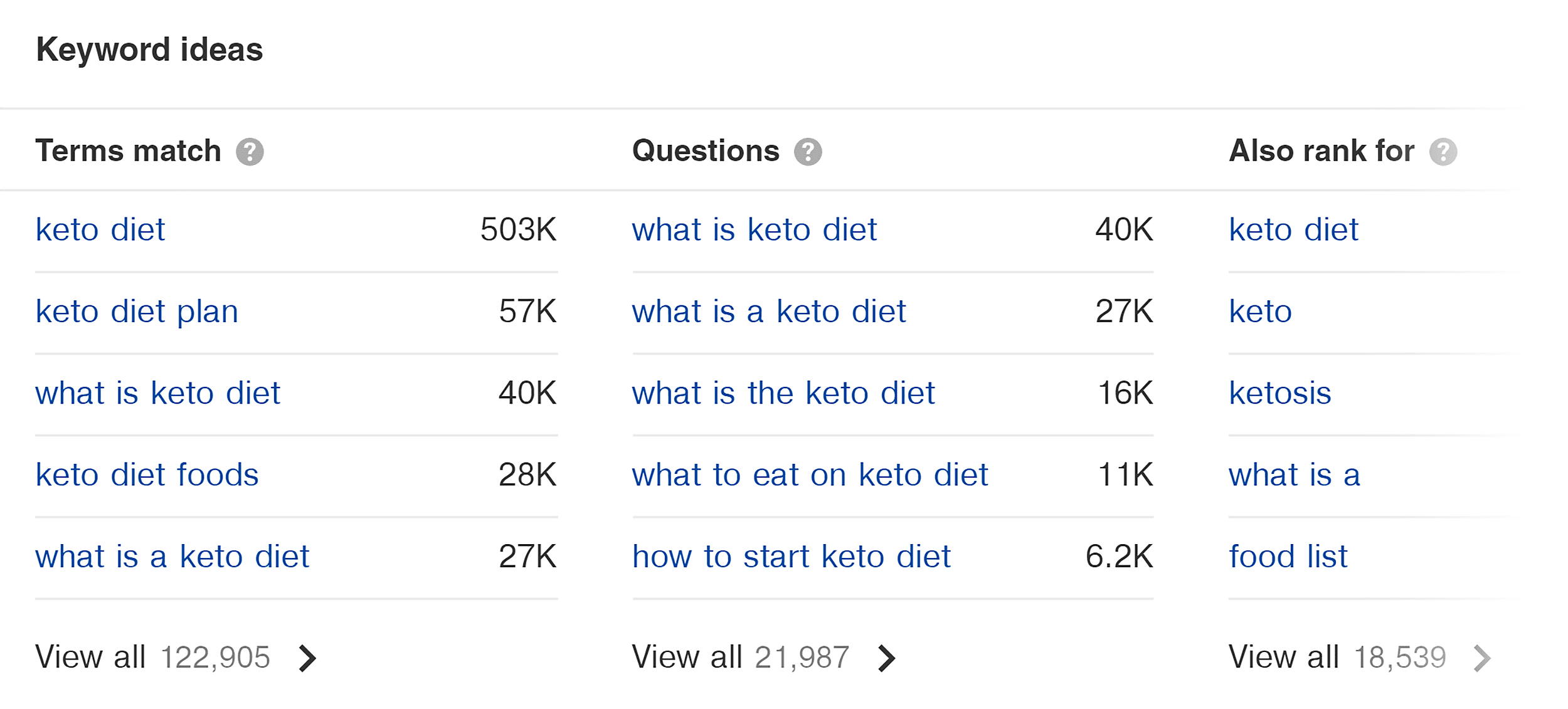
What’s unique about Keyword Explorer is the fact that Ahrefs doesn’t just show you search volume.
(Although they give you that data too.)
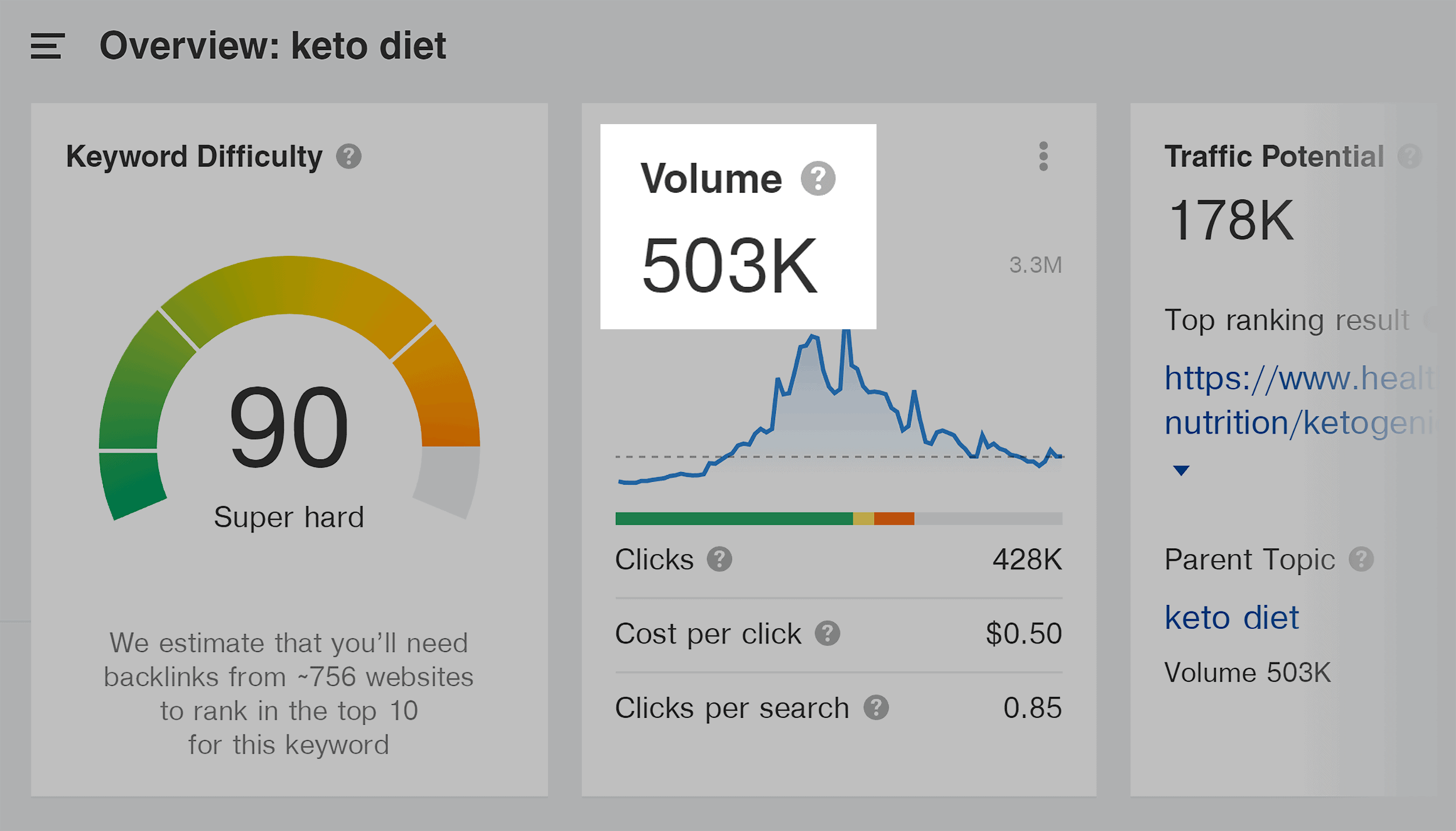
They also let you know how many clicks you’ll get if you rank for that keyword.
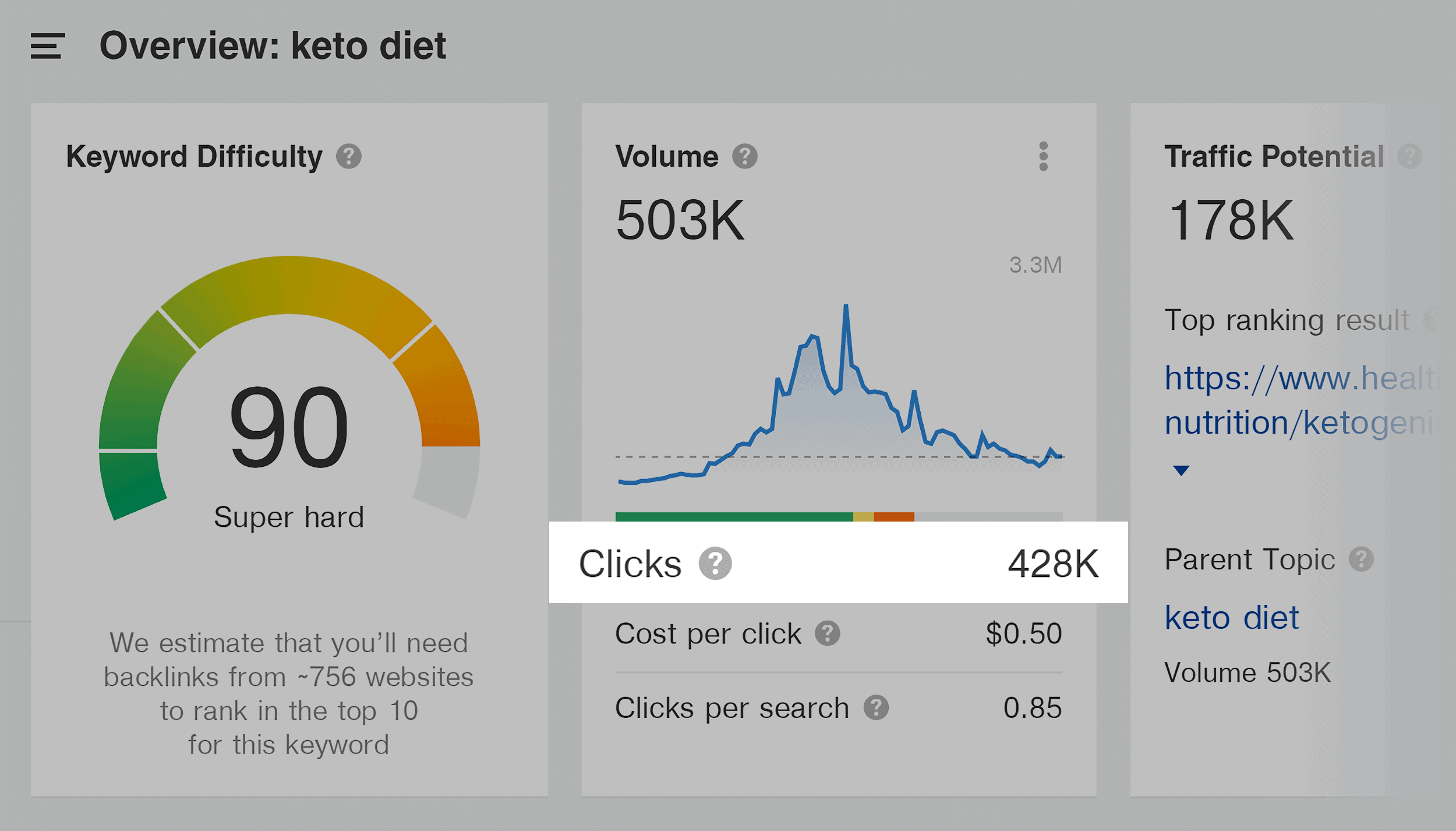
Why is this important?
It’s no secret that Google is packing the SERPs with features that “steal” clicks from the organic results.
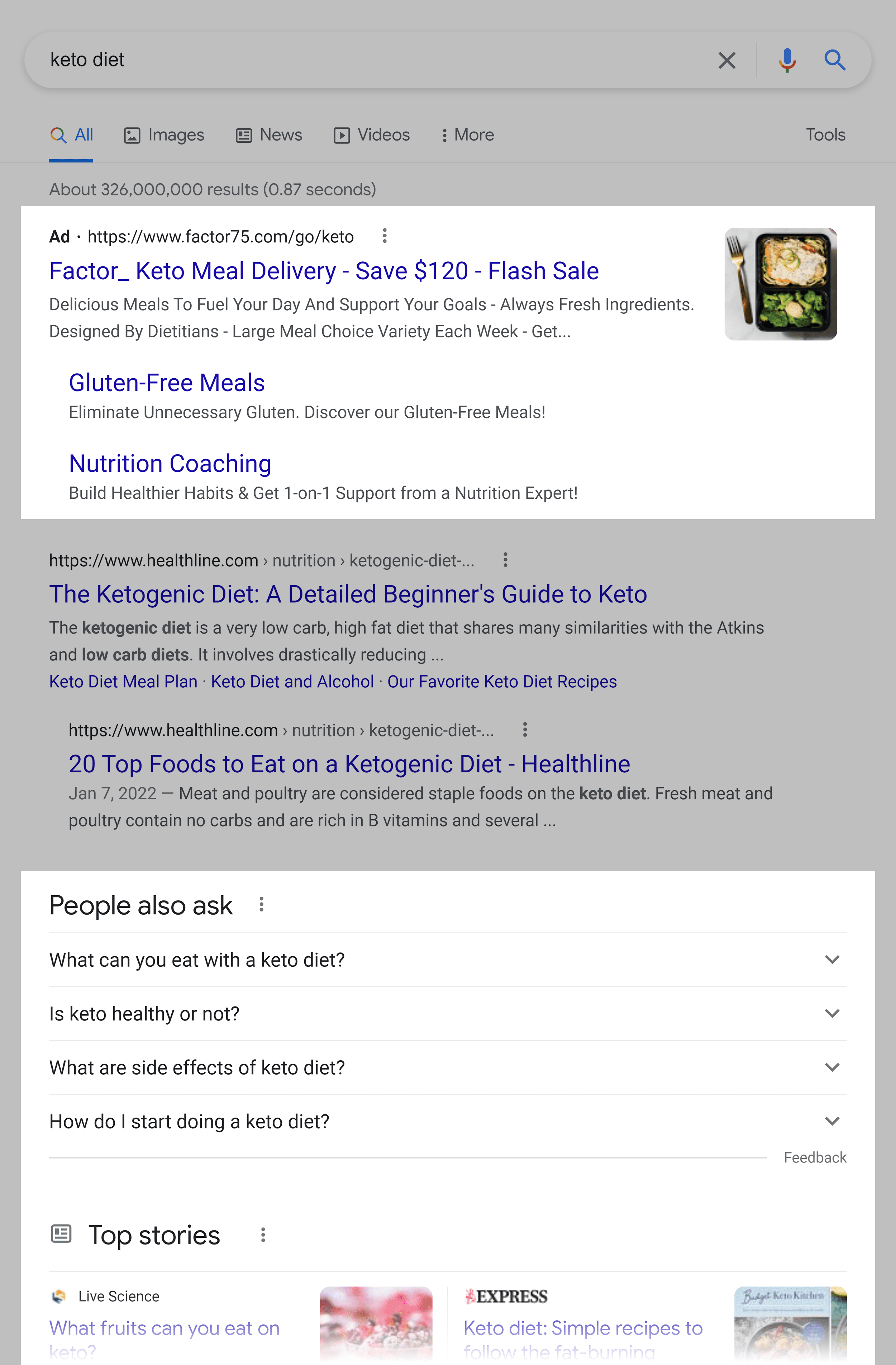
And Keyword explorer takes this into account.
For example, the keyword “leonardo dicaprio age” gets 18k searches per month:
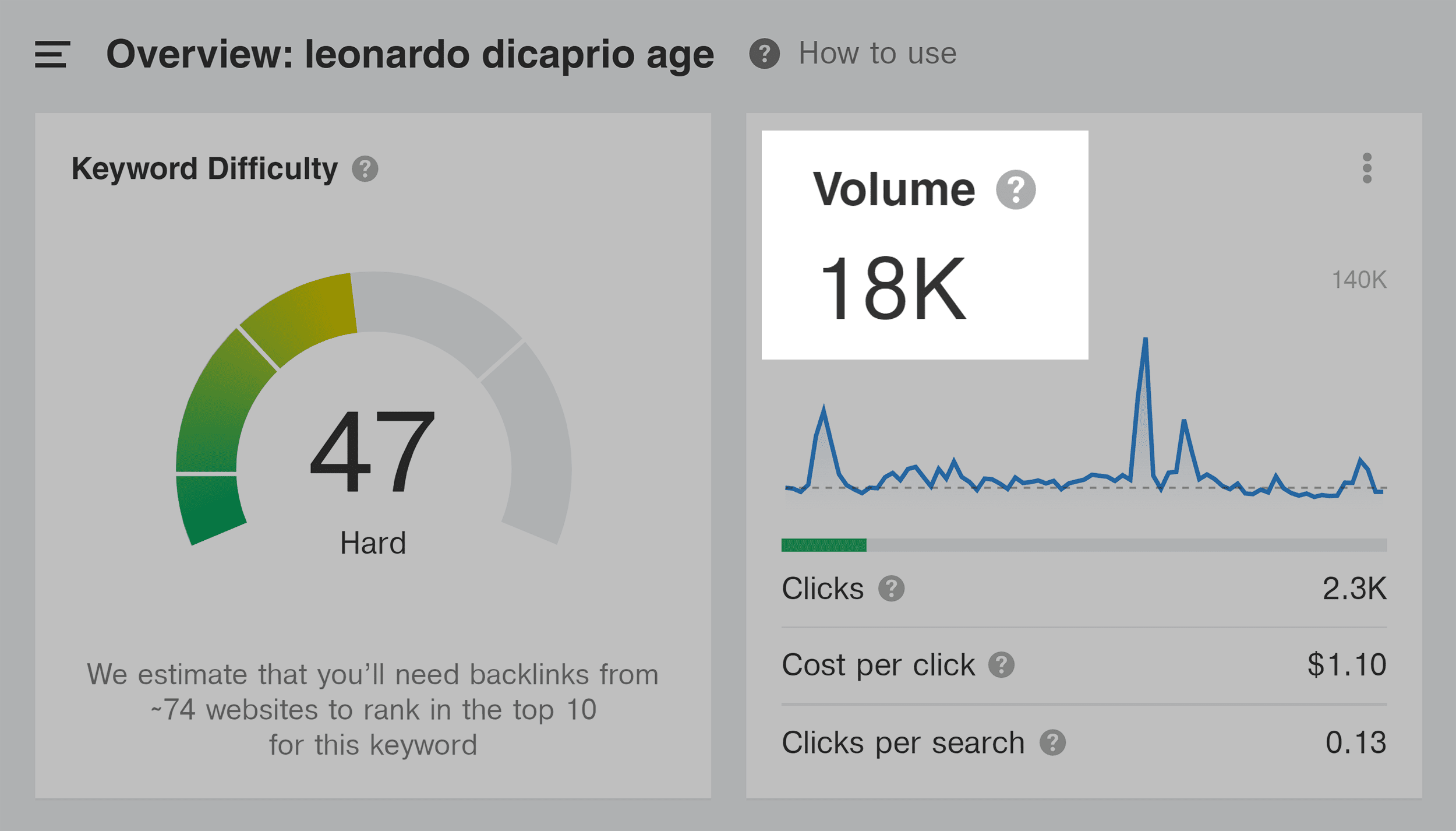
When you search for that keyword, the answer shows up in a Featured Snippet.

Which is why only 2.3k people (around 12.7% of all searchers) actually click on an organic result.
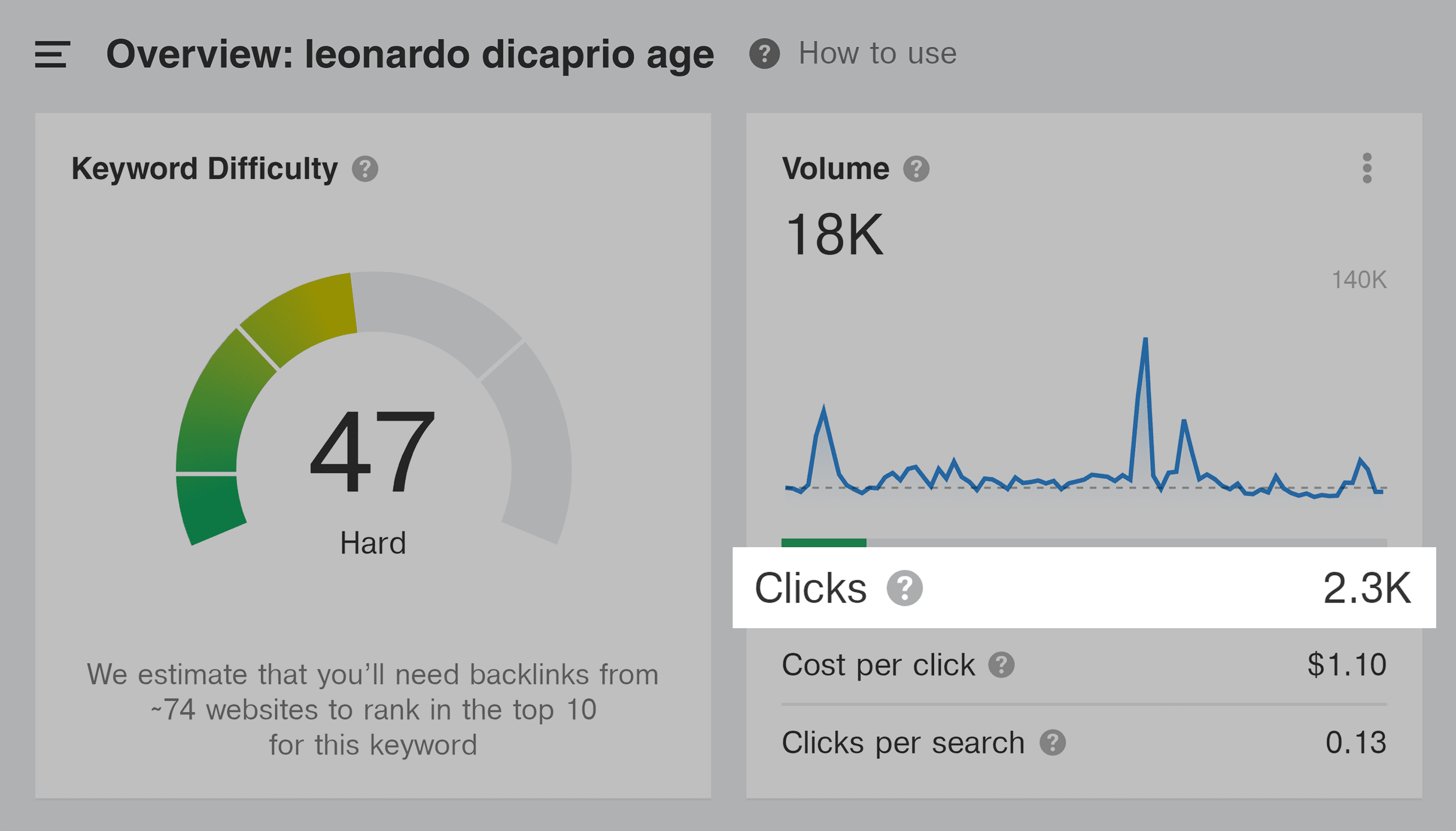
One other thing that makes Keyword Explorer cool is the fact that you can expand the results to get hundreds of different keyword ideas.

You can also reverse engineer a competitor’s site using “Organic keywords” report.
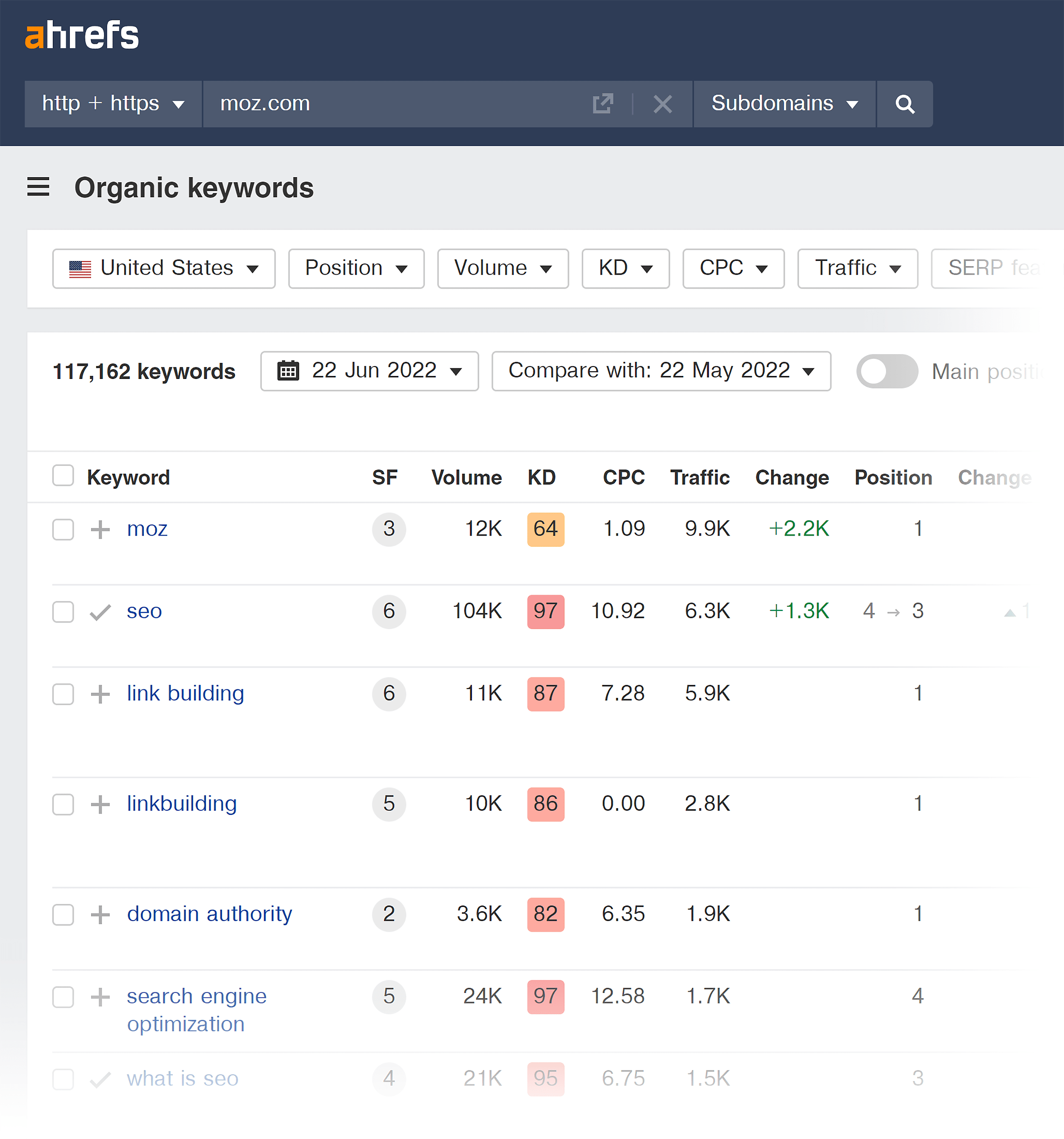
Overall, I have to say that Semrush wins this feature battle by a hair. Ahrefs may have a cleaner overall UI. But Semrush just gives you lots more data (both SEO and PPC), which makes it a more well-rounded keyword tool.
Start your keyword research
Explore the largest keyword database.
Which Tool Is Best for Analyzing Backlinks?
Next, I wanted to see which tool had the best backlink checker feature.
I actually compared the link index in Semrush and Ahrefs (along with Moz Pro and Majestic), a few years ago.
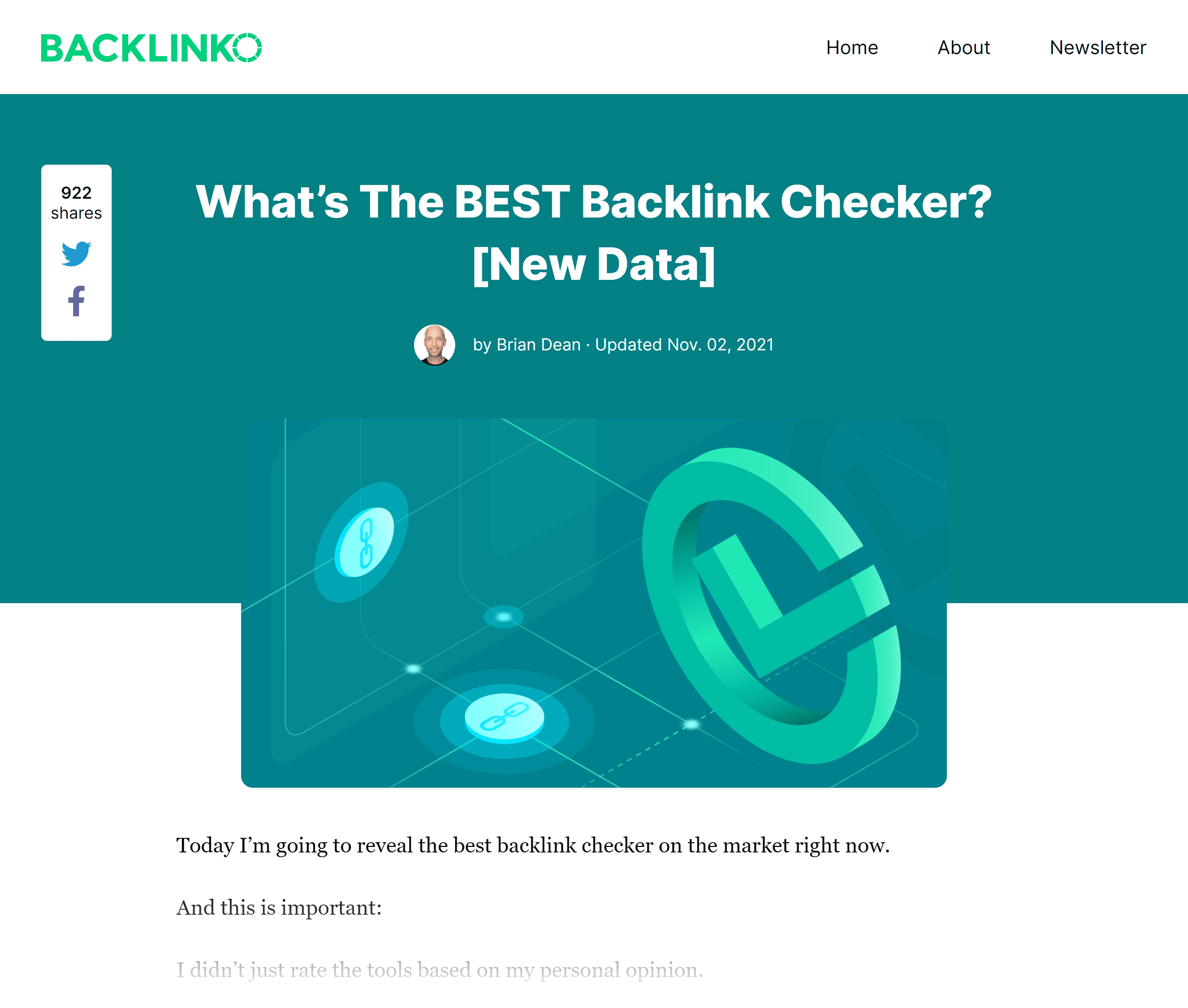
In that analysis, Semrush and Ahrefs were virtually tied.
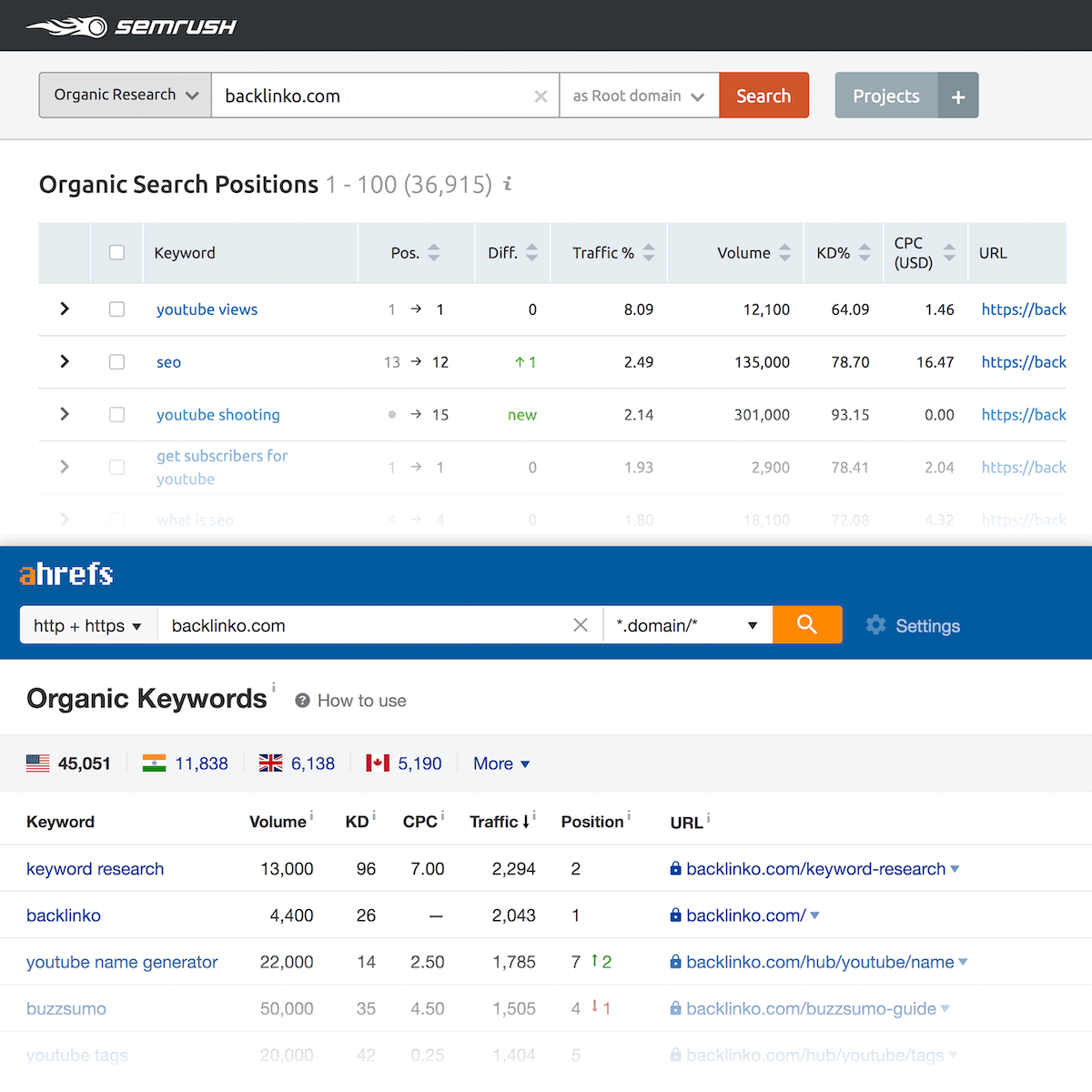
Let’s see which tool can find the most backlinks today.
For this mini-test, I used my own blog, Backlinko.com.
Ahrefs found a total of 49K referring domain links. And Semrush found 71.5K.
| SEO Tool | Total Referring Domains |
|---|---|
| Ahrefs | 49K |
| Semrush | 71.5K |
And when it comes to total backlinks, Ahrefs found 419K. Semrush found 2.1M.
| SEO Tool | Total Backlinks |
|---|---|
| Ahrefs | 419K |
| Semrush | 2.1M |
So based on this tiny case study, Semrush has a larger link index. Which shows that they’re seriously investing in their link index and backlink analysis feature set.
That said, the size of the index is only ONE factor to consider.
For example, the UI also matters…
If you can find everything you need without needing to click a bunch of times, that’s a huge win. Link building is time-consuming enough. You don’t want it to take even longer because your tool is hard to use.
For example, I like the fact that Ahrefs shows you a sneak preview of the text that appears around each backlink.
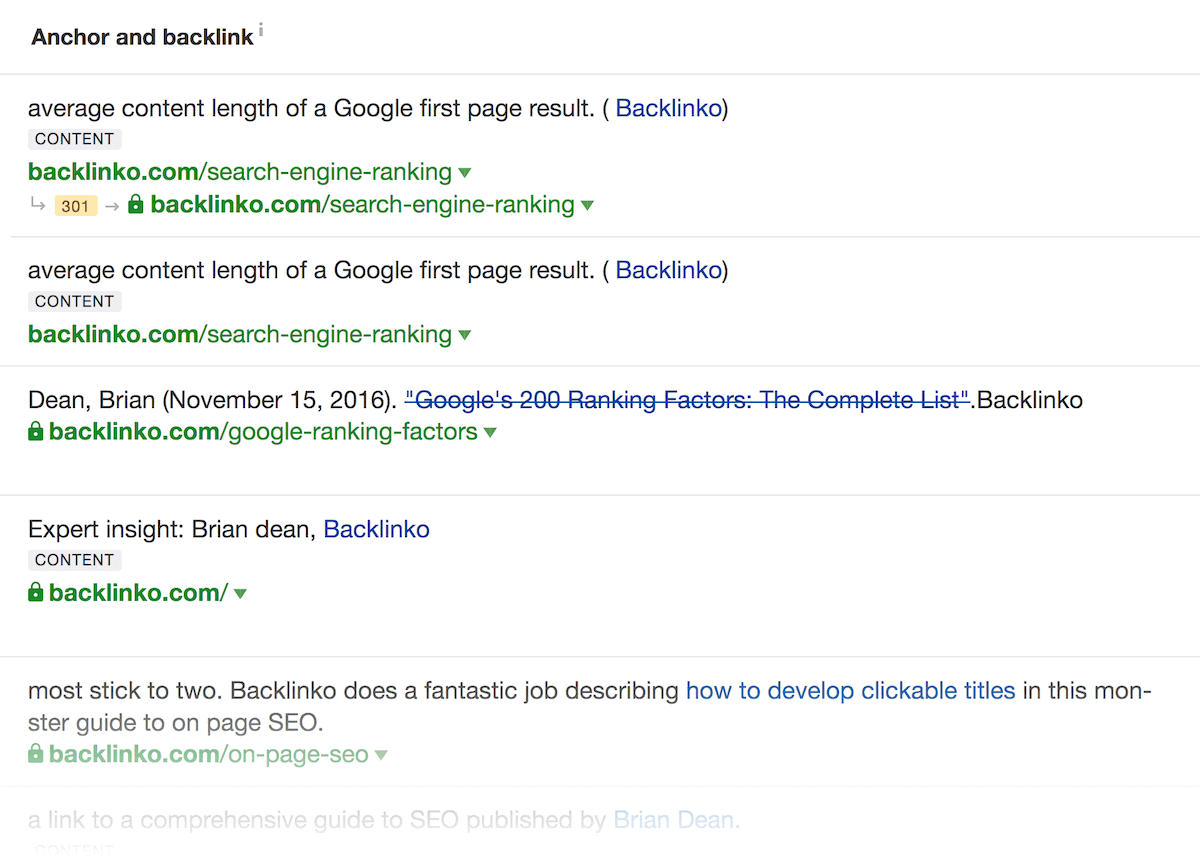
This makes it easy to see WHY people are linking to a specific page.
Well, as it turns out, Semrush also added this feature to their link index.

However, I personally find Ahrefs easier to use overall for link stuff. It takes fewer clicks to see a page’s best links. The pages that have the most links. And more.
This was another tough one. But I have to say when it comes to backlink features, Semrush and Ahrefs are tied. Semrush’s newly-expanded index is great. And the UI has come a long way. But when I want to analyze a site’s link profile, I find the Ahrefs UI a little easier to use.
Find all of your backlinks
Explore the largest, fastest, and freshest backlink management tool.
Which Tool Has The Best Technical SEO Site Audit Feature?
The next feature I wanted to look at was technical SEO analysis.
In other words:
Which tool is best for finding technical SEO problems (and opportunities)?
Like with my backlink analysis, I ran my site through each of their site audit tools.
Let’s see what happened next…
Semrush
Semrush has a very solid site audit feature.
Yes, you get an overall health score that gives you a general idea of how SEO-friendly your site is.
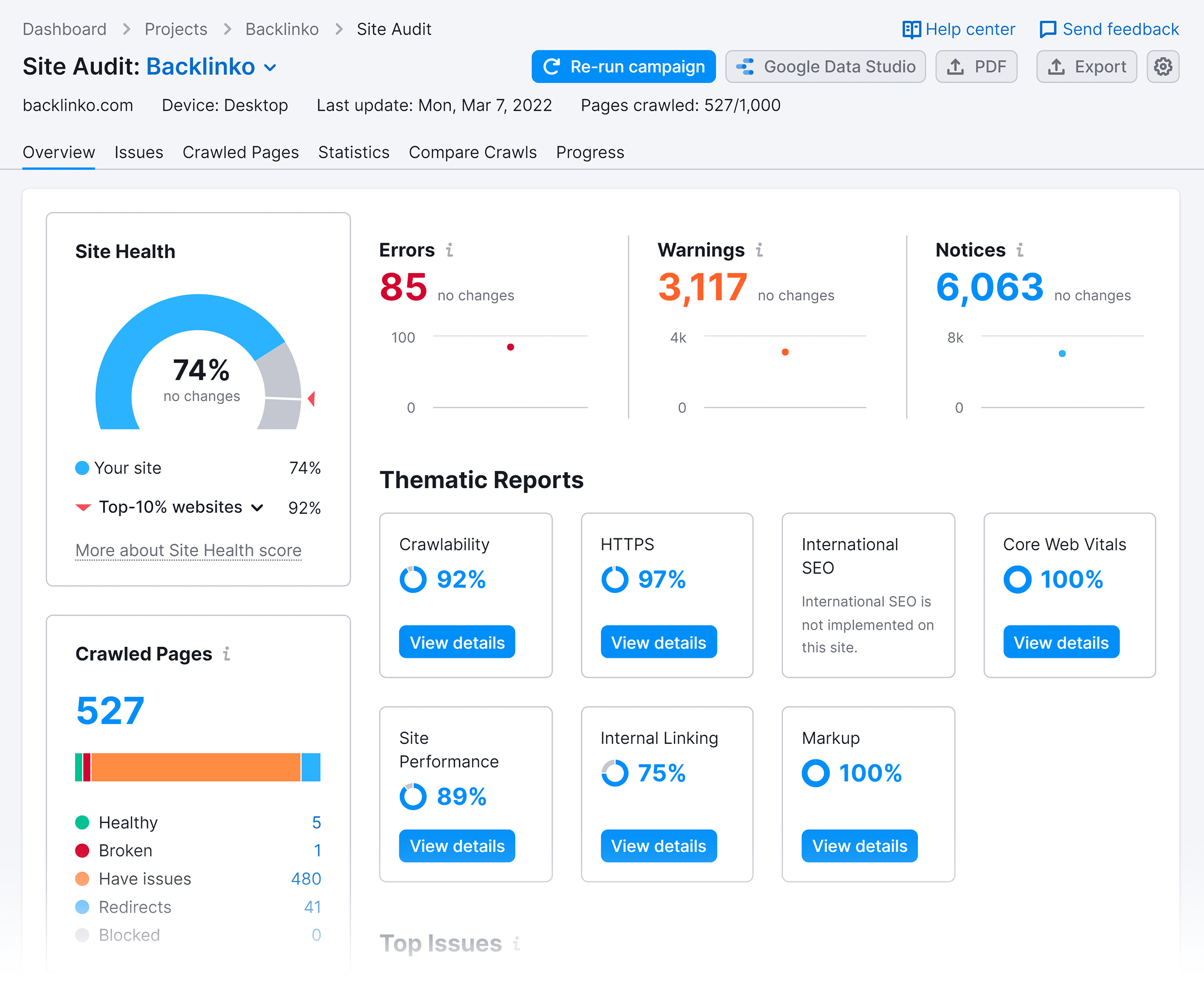
(At least when it comes to technical SEO.)
And Semrush also lets you know if your site has SEO issues in terms of:
- Broken links
- HTTP status code errors
- Crawl errors
- Issues with robots.txt
Plus, they give you a list of things to start working on right away.
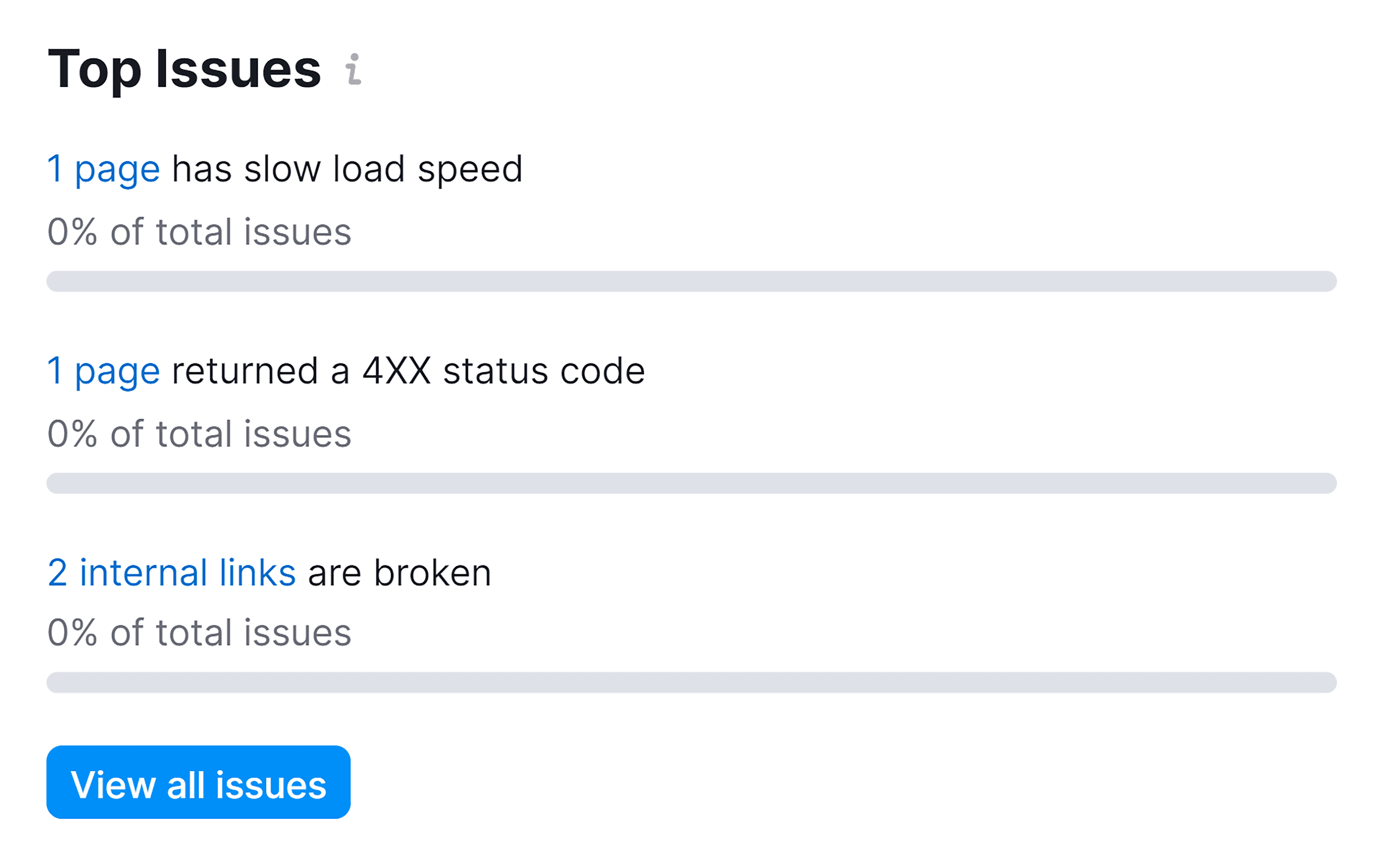
Finally, Semrush has a cool “internal link distribution” report.
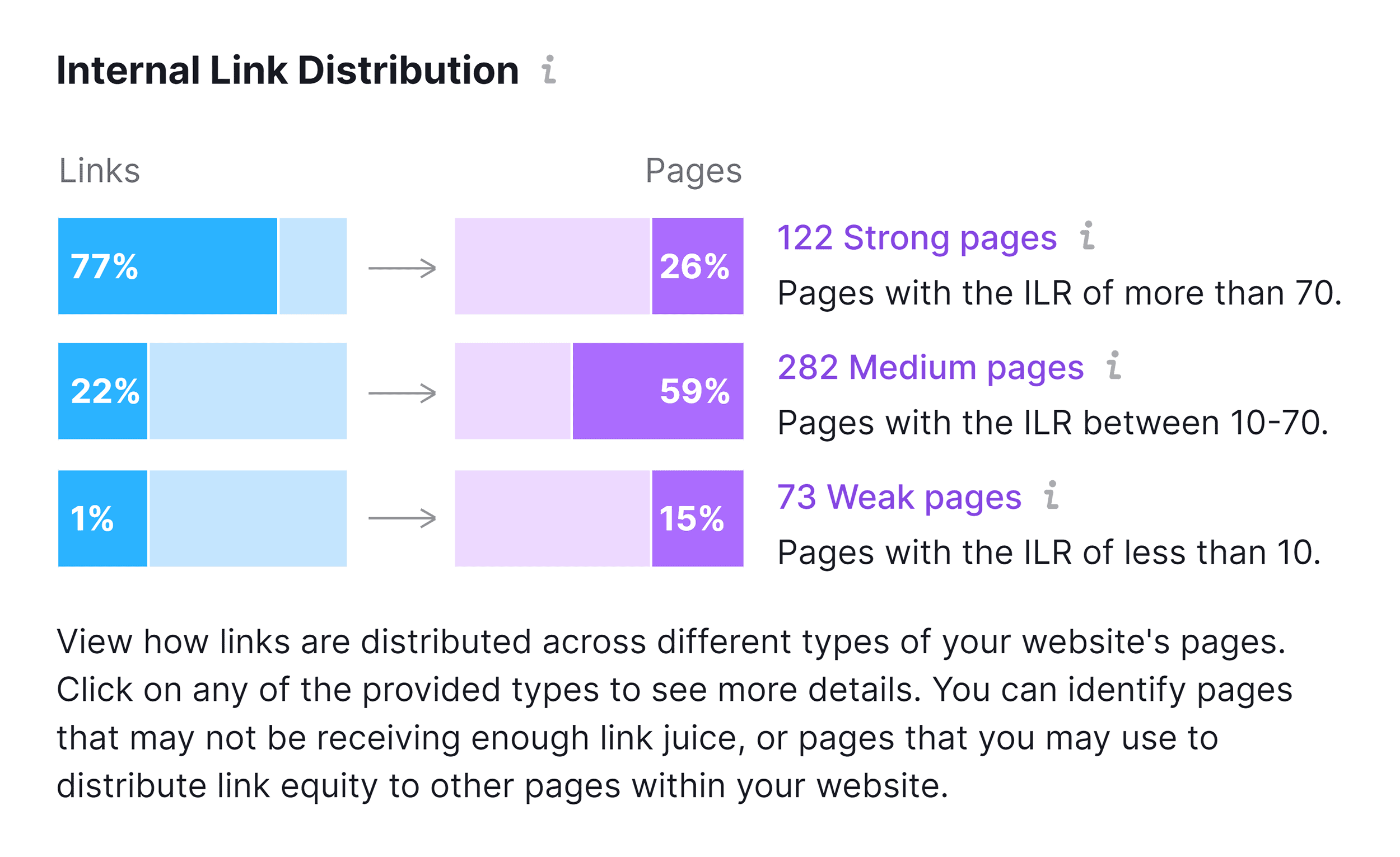
This breaks down how well your internal links are setup for SEO. In general, you want to internal link FROM high-authority pages TO pages that need a bigger authority score.
And this report lets you know if your site’s link authority is flowing in the right direction.
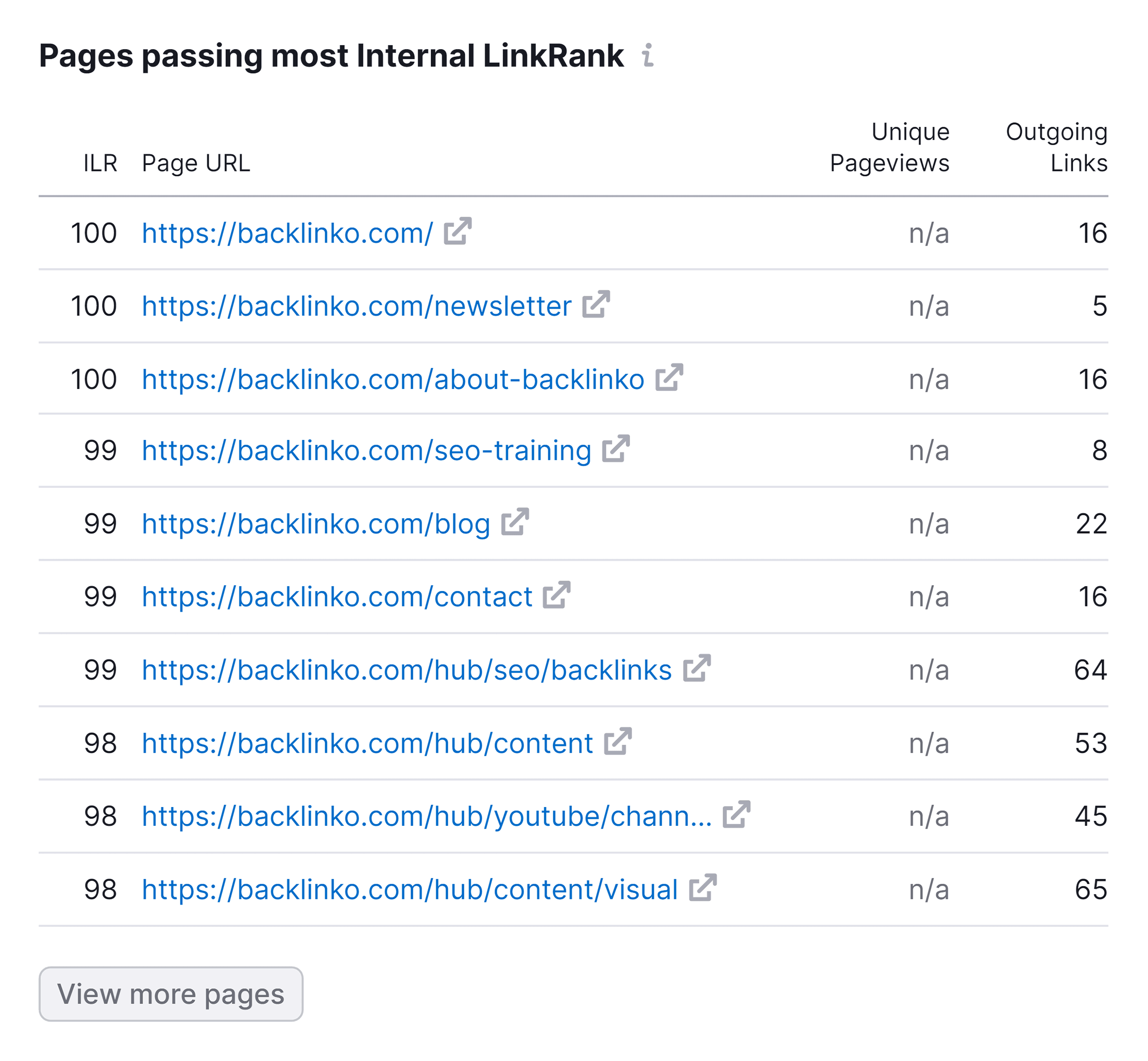
Ahrefs
Ahrefs gave my site an overall SEO health score of 81%.
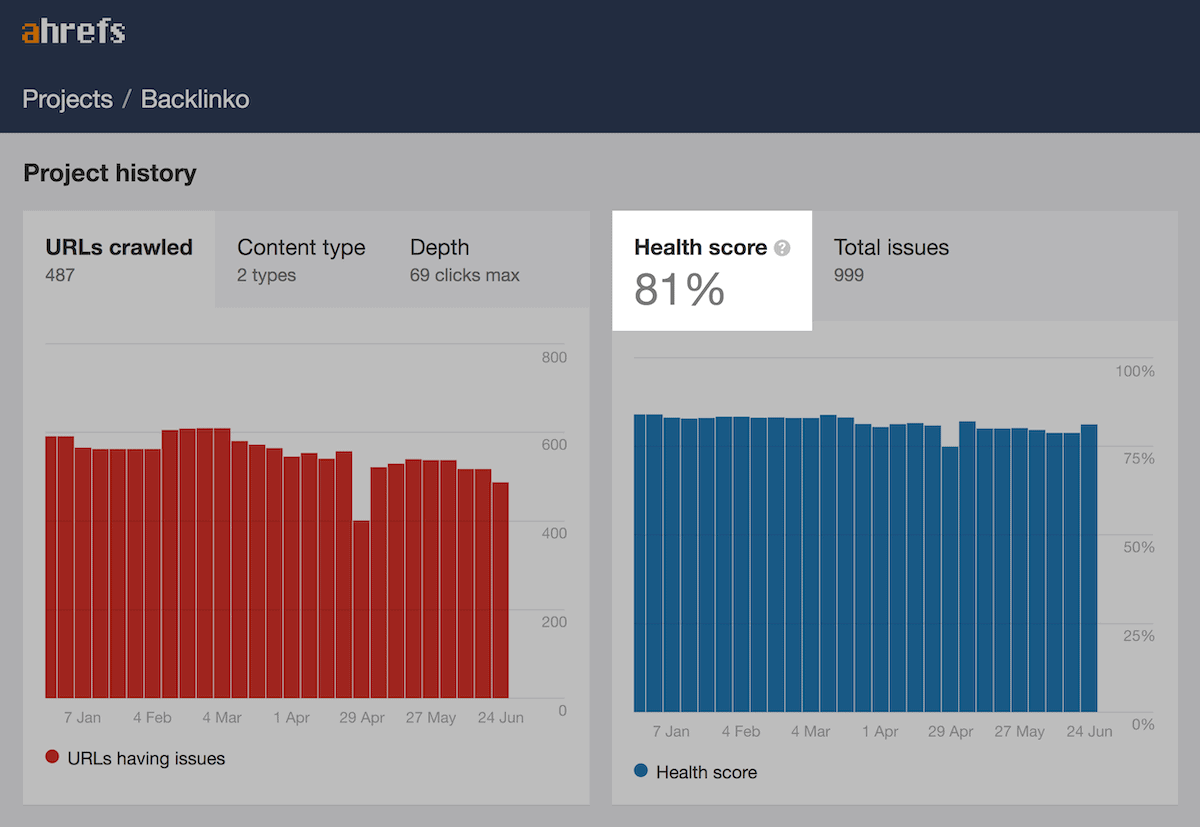
This was largely based on the fact that my site has 300+ pages with the “noindex” tag.
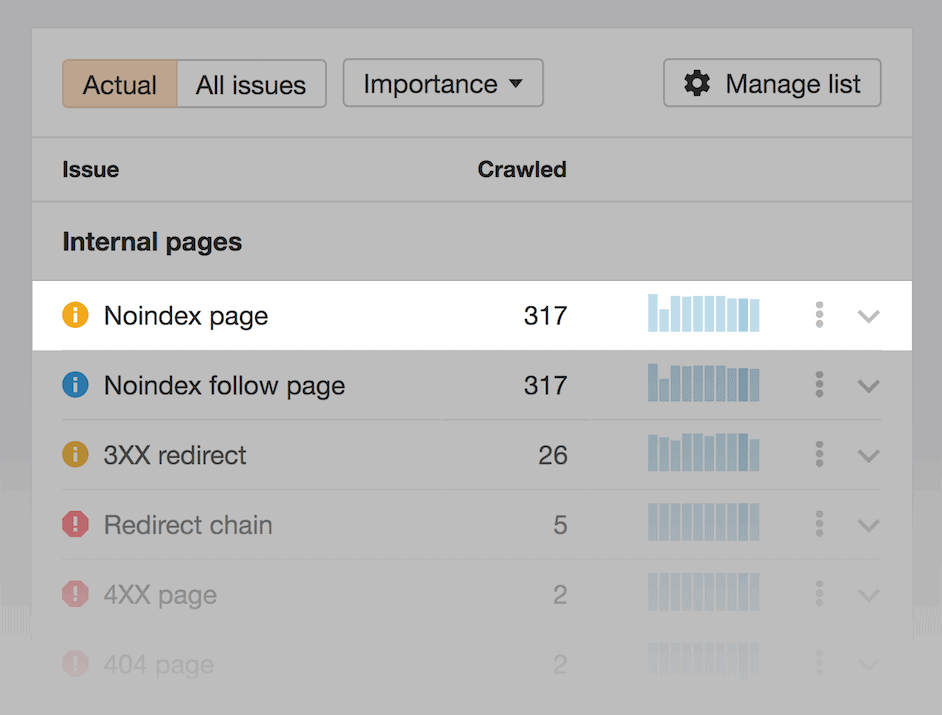
This isn’t actually a problem (we add them to pages that we don’t want Google to index).
So I don’t agree with Ahrefs that this is actually a problem. It definitely can be an issue. But it’s something that should be placed under a “thing to look at” category vs. something that impacts your SEO health score.
They also found a few other issues, like slow-loading pages and meta descriptions that were too short.
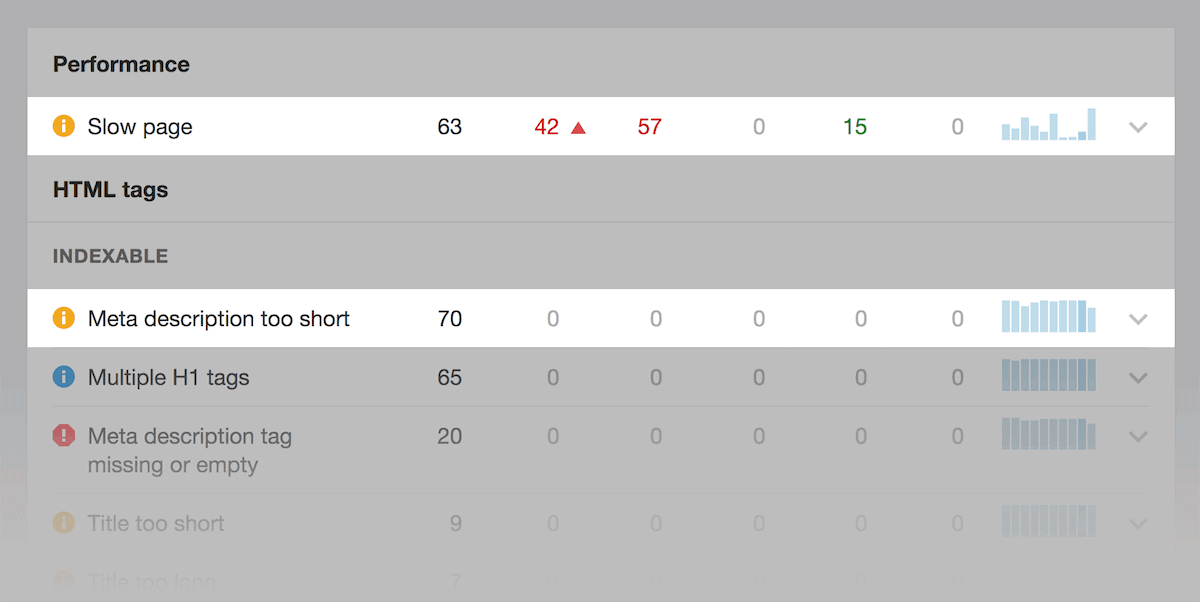
To me, those ARE real problems that are worth fixing. So it’s nice to see that Ahrefs found them. Unfortunately, these actual issues were kind of buried underneath “issues” like noindex tags and pages that have a 301 redirect.
Ahrefs also recently added a “Structure Explorer” feature.
As the name suggests, this shows you how “deep” different pages are from your homepage.
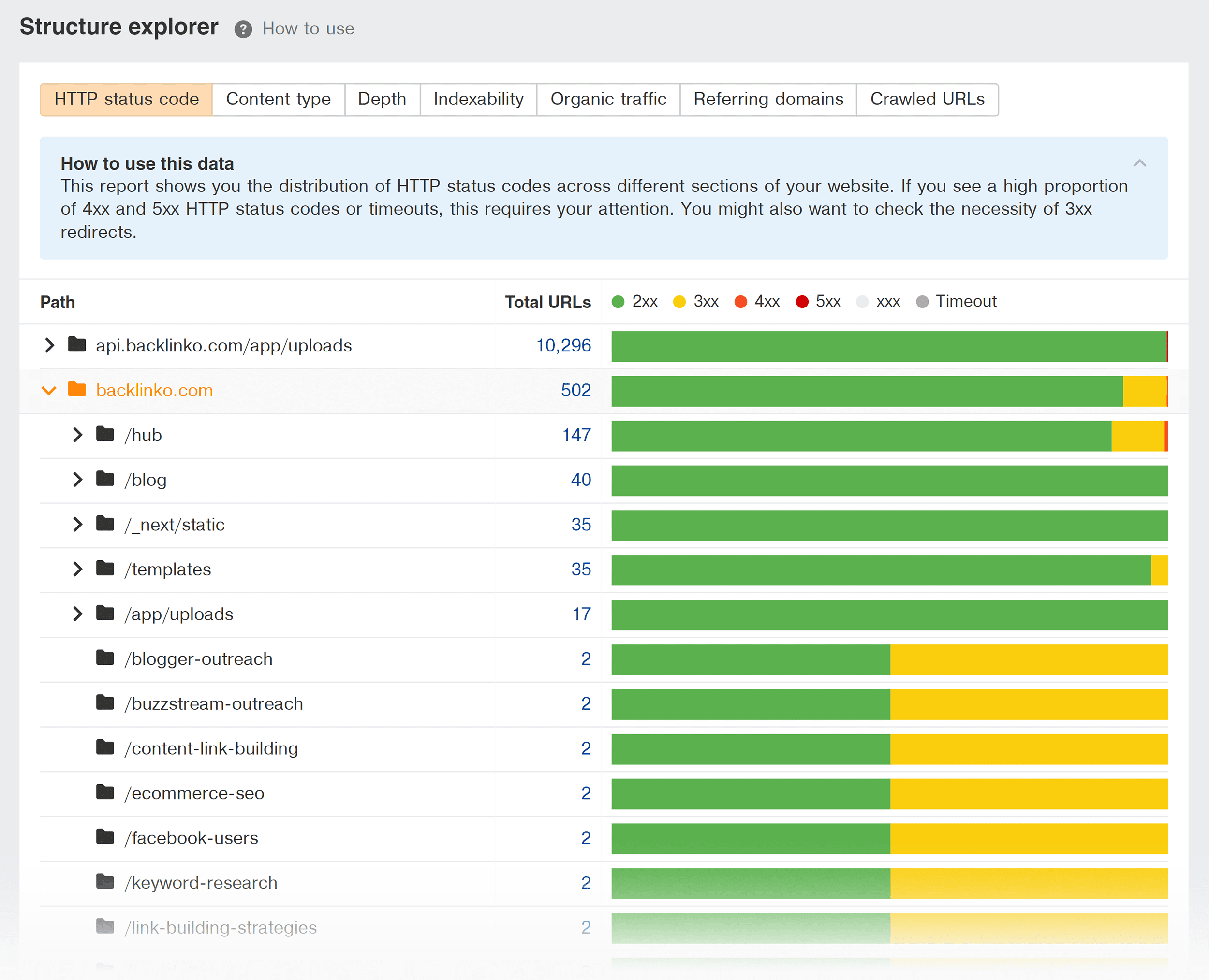
In general, you want to have a “flat” site architecture. So this is a really easy way to see whether or not your site has pages that are too many clicks away from your homepage.
When it comes to technical SEO features, Semrush comes out on top. Its site audit features are more robust. And in my opinion, it does a better job of letting you know what you need to take action on first.
Which Tool Is Best for Rank Tracking?
Both Ahrefs and Semrush have rank tracking tools.
Let’s see which one is the best.
Semrush
Like any rank tracker, Semrush regularly checks to see where you rank in Google for a set of keywords that you give it.
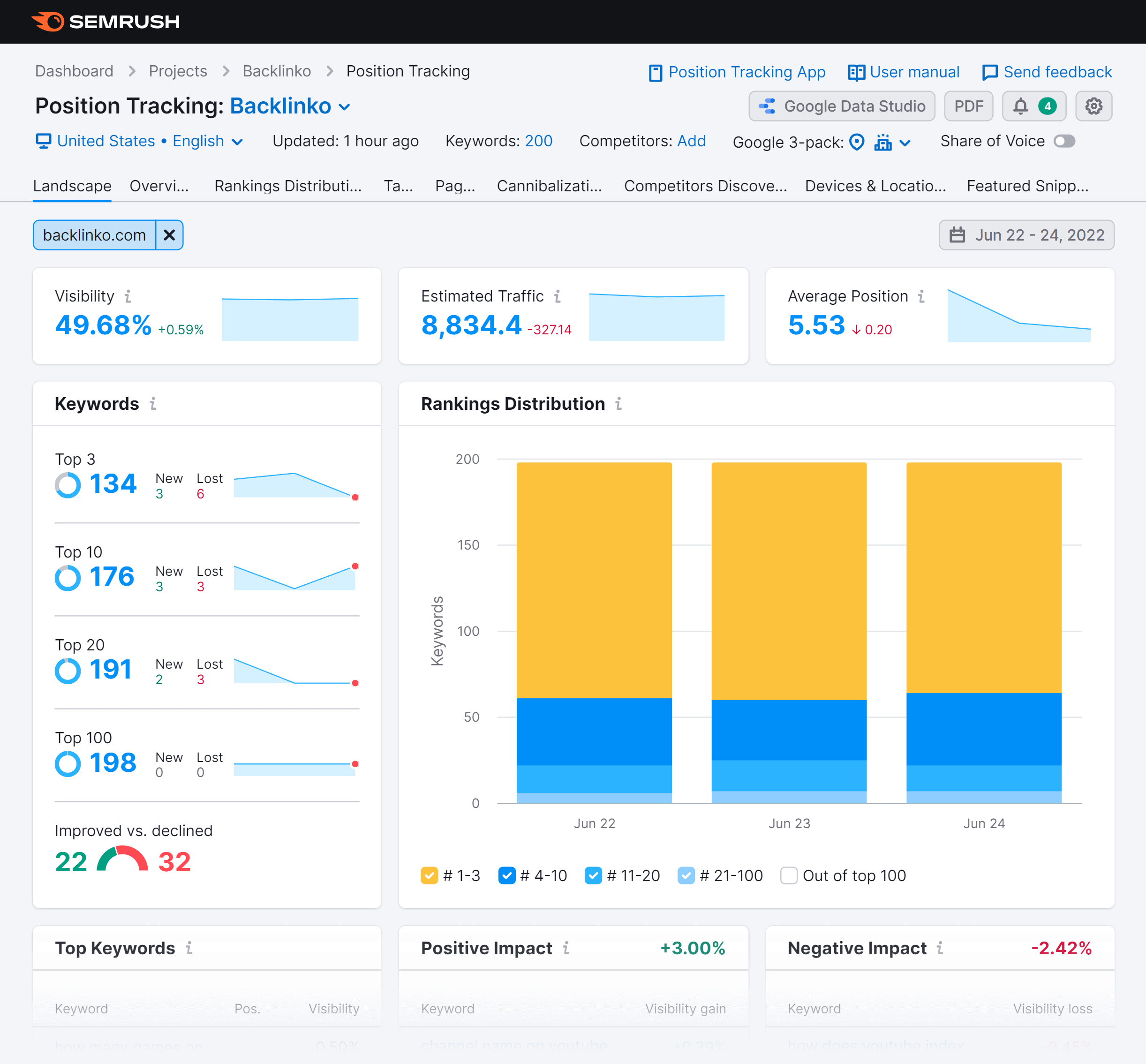
That said, Semrush does have a few more features than Ahrefs here. For example, they have a “Visibility” score.
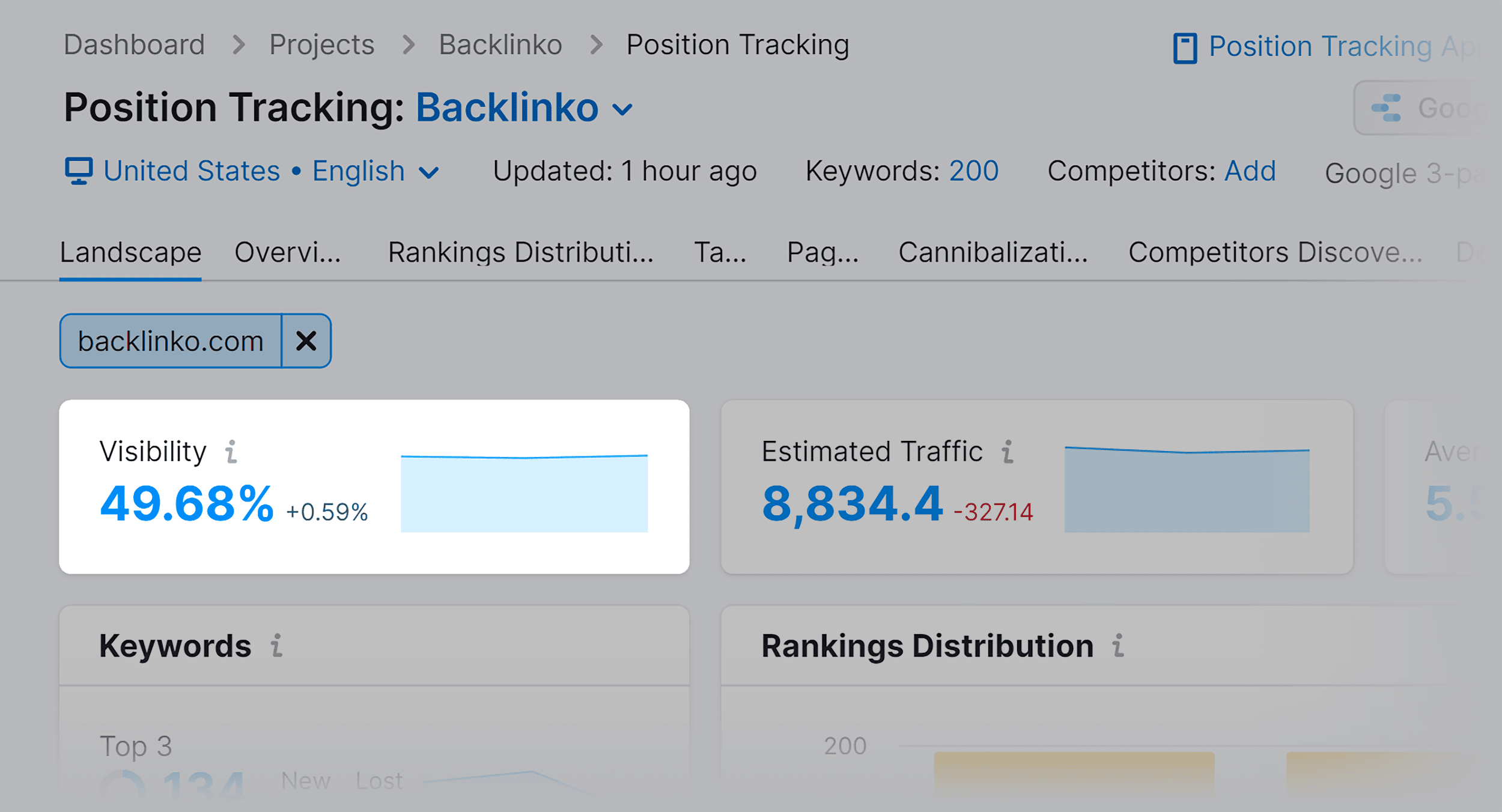
The other thing that separates Semrush is that they update tracked keywords pretty much every day.
Unfortunately, Ahrefs only updates theirs once or twice a week (depending on your pricing plan).

So if you’re someone that needs to stay on top of rankings changes, once per week may not cut it.
Ahrefs
Ahrefs also has a super accurate rank tracker.
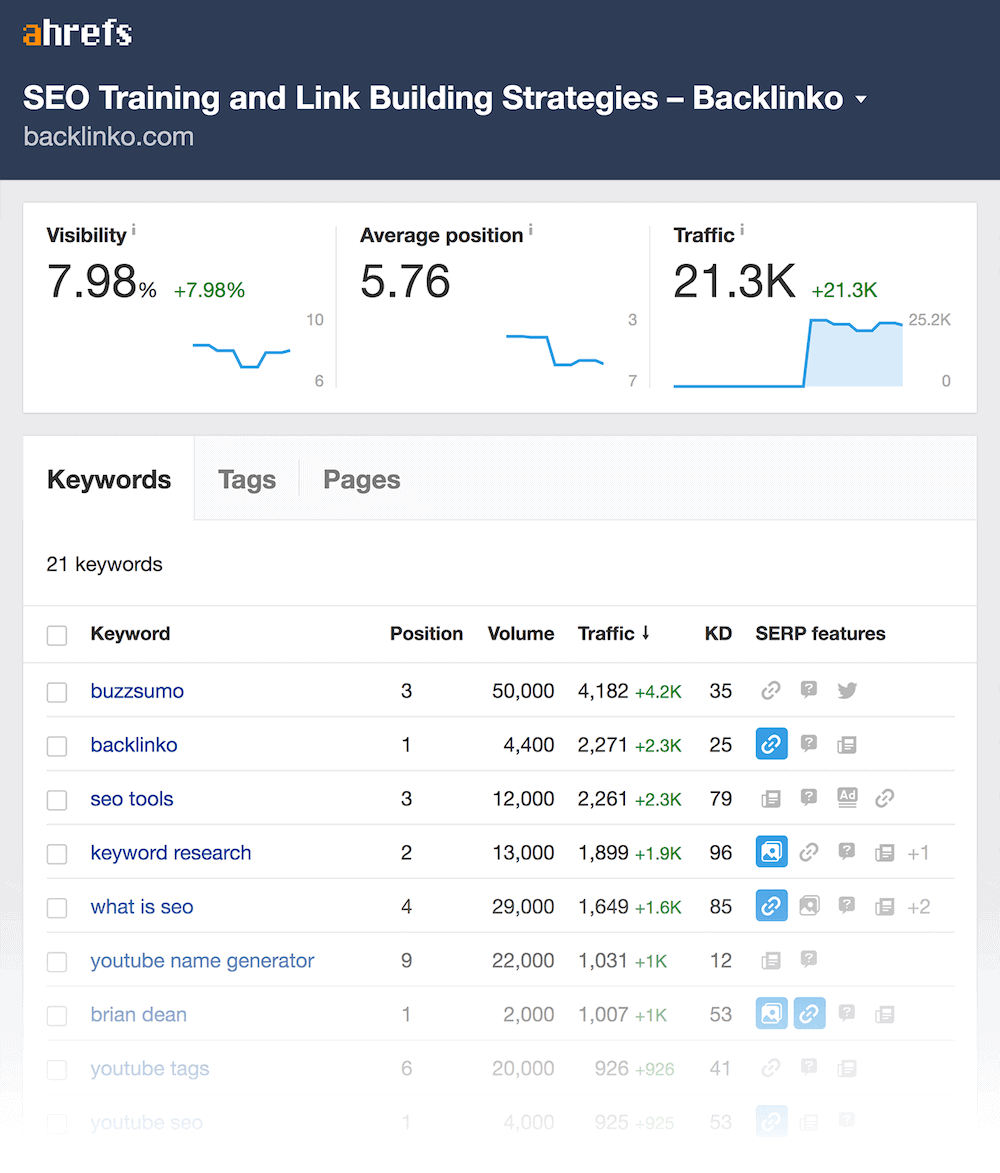
I spot checked a few of the keywords, and the rankings seemed to match what Ahrefs reported. There’s not much else to say here.
In terms of rank tracking, Semrush beats out Ahrefs. Both do what rank trackers are supposed to do: track your rankings. But Semrush updates more often and has more robust features.
Check Your Website's Rankings
See what keywords you already rank for and start tracking their progress.
Which Tool Has The Best Support?
For some people, the support that a piece of SEO software comes with is as important as any feature.
Which is why I decided to put each tool’s support to the test.
For this test I send the same exact question to each support team:
Hey guys, I’m wondering how you calculate search volume for keywords. Is data from the Google Keyword Planner or another source?
This was a relatively simple question. But not something super basic like “how do I change my password?”.
Let’s see how each tool performed.
Ahrefs
To send my question to Ahrefs, all I needed to do was click on a little chat button in the bottom right corner of the page.
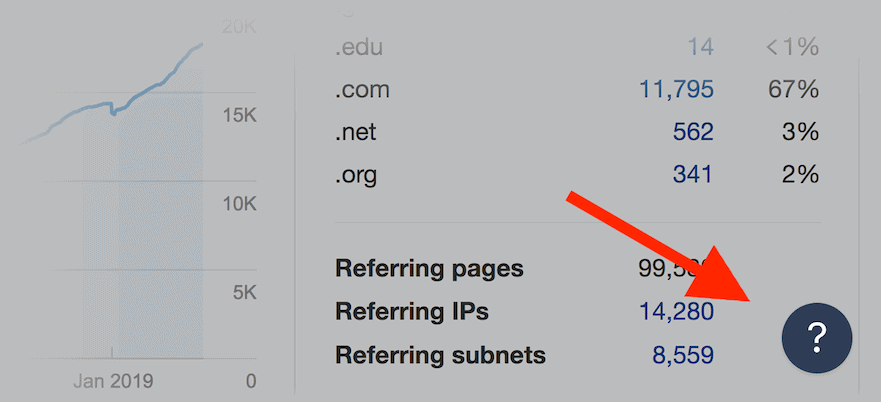
Easy peasy.
It wasn’t actually live chat. But I was happy with the fact that it took about 5 seconds to actually ask a question.
And about 10 minutes later, I received this helpful reply:
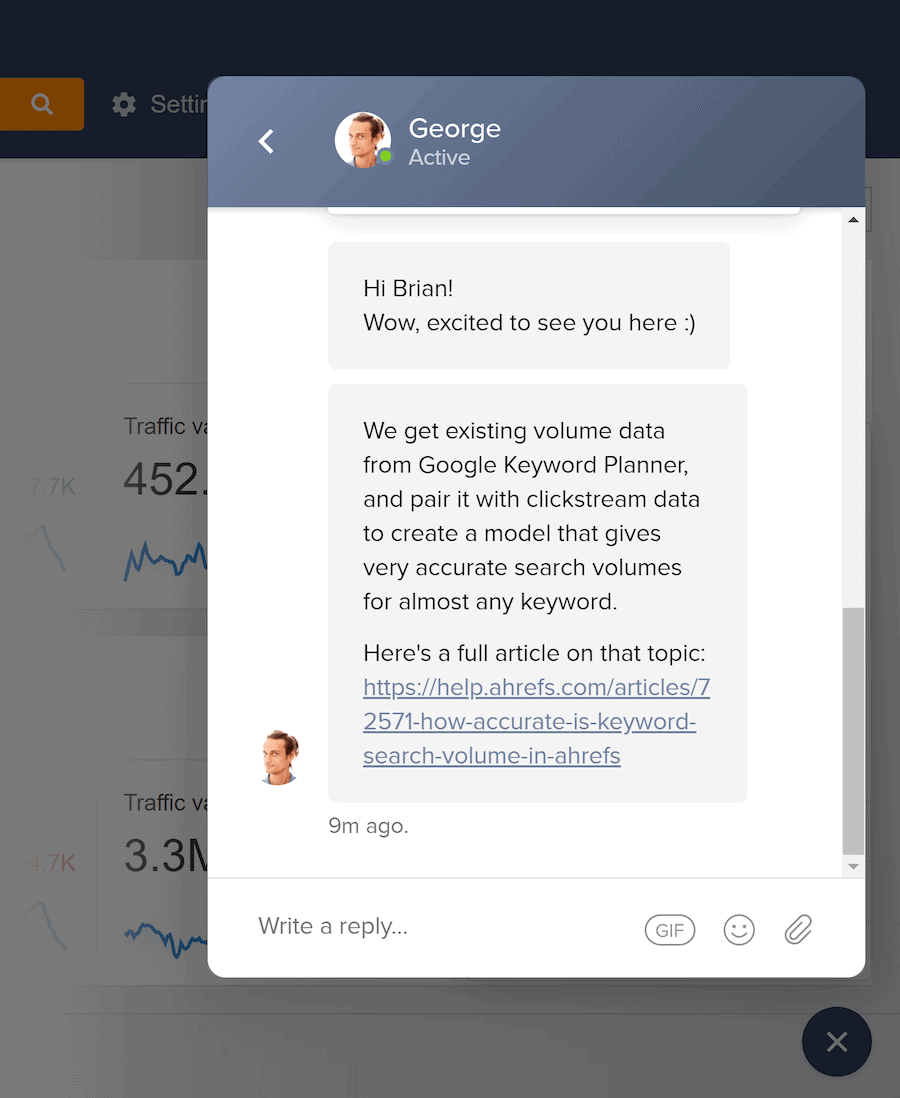
Nice.
Semrush
Semrush’s support is similar to what I’ve experienced with Ahrefs.
Like Ahrefs, Semrush offers live chat while logged in:
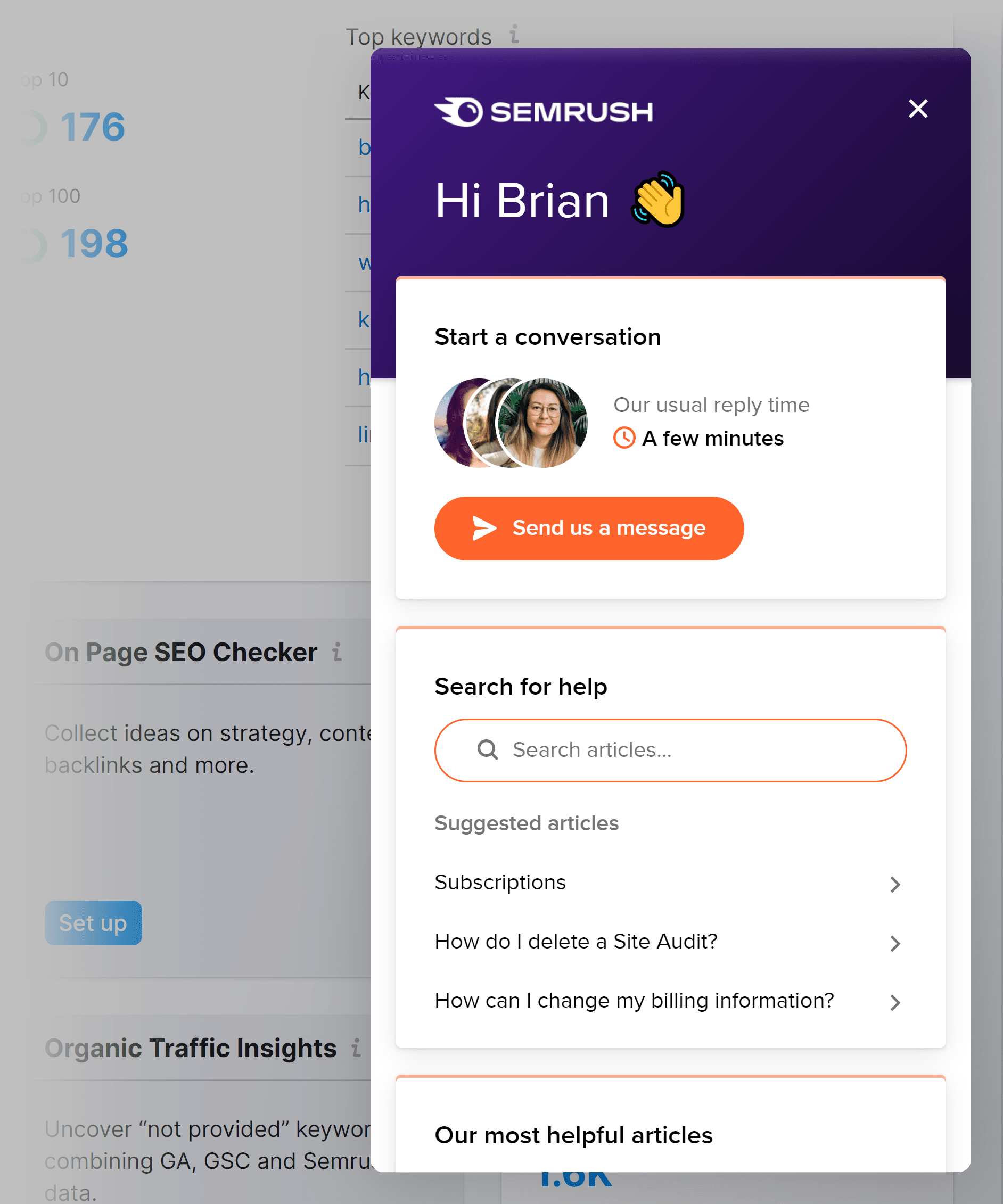
And in my experience, their support team replies super quickly.
Overall, both tools provide fantastic support.
Which Tool Has Cool Unique Features?
At this point we’ve compared the main features of each tool. Now it’s time to look at some of the unique features that make Ahrefs and Semrush unique.
Semrush
Semrush has a few cool features that Ahrefs doesn’t have.
The biggest is their complete paid search software suite (Ahrefs has very limited features for PPC).
And Semrush has A TON of PPC competitor analysis features to help you get the most out of your Google Ads campaigns.

And if you do a lot of local SEO, Semrush has a “listings” tool that helps you set up your NAPs the right way.
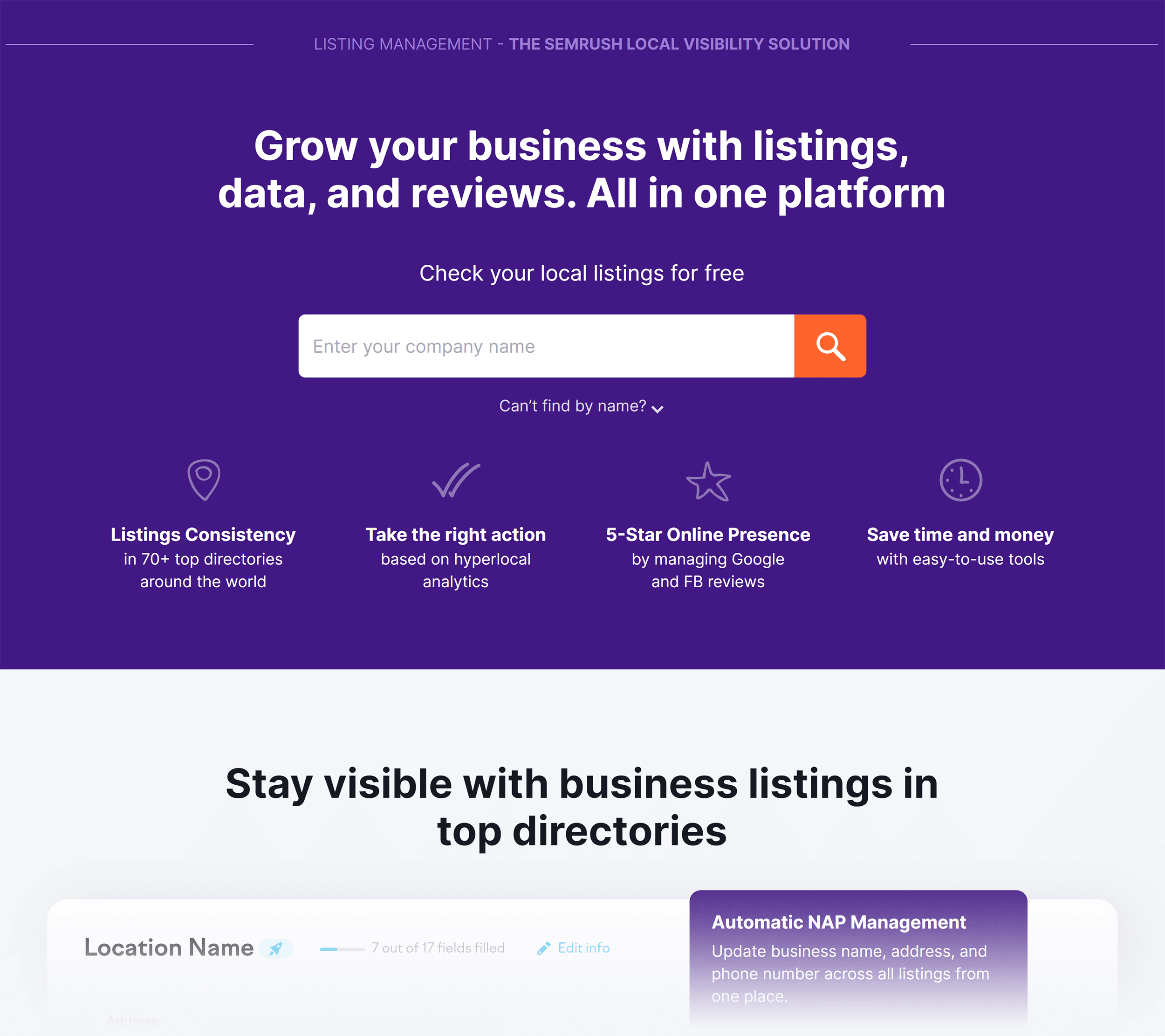
(And find NAP opportunities that you may have missed.)
The ultimate local business toolkit
Listings, data, and AI-powered reviews — all in one platform.
Another cool feature is Semrush Copilot, an AI assistant. It reads data from your Semrush reports and provides intelligent alerts and recommendations to improve your SEO.
For instance, Semrush Copilot tells you when keywords are experiencing a significant traffic drop, so you turn it around.

And what backlinks you’ve lost so you can make an SEO strategy to recover them.

Copilot prioritizes recommendations by urgency and potential impact on your website, saving you a ton of time doing it manually.
Ahrefs
In my opinion, the one feature that makes Ahrefs different than most other SEO tools is: “Content Explorer”.
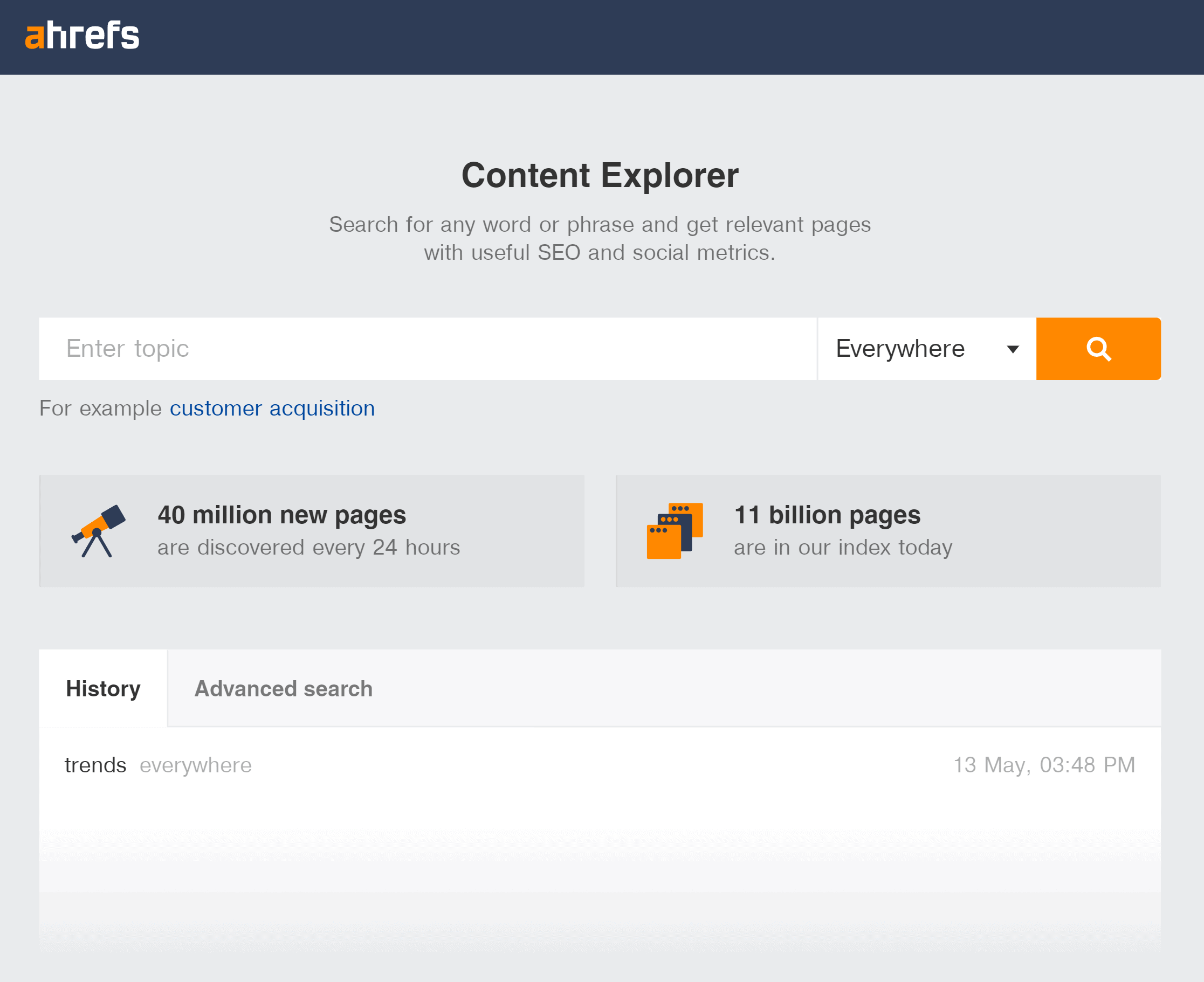
If you’ve ever used BuzzSumo before, then you know how this feature works.
Type in a topic that you want to write about…
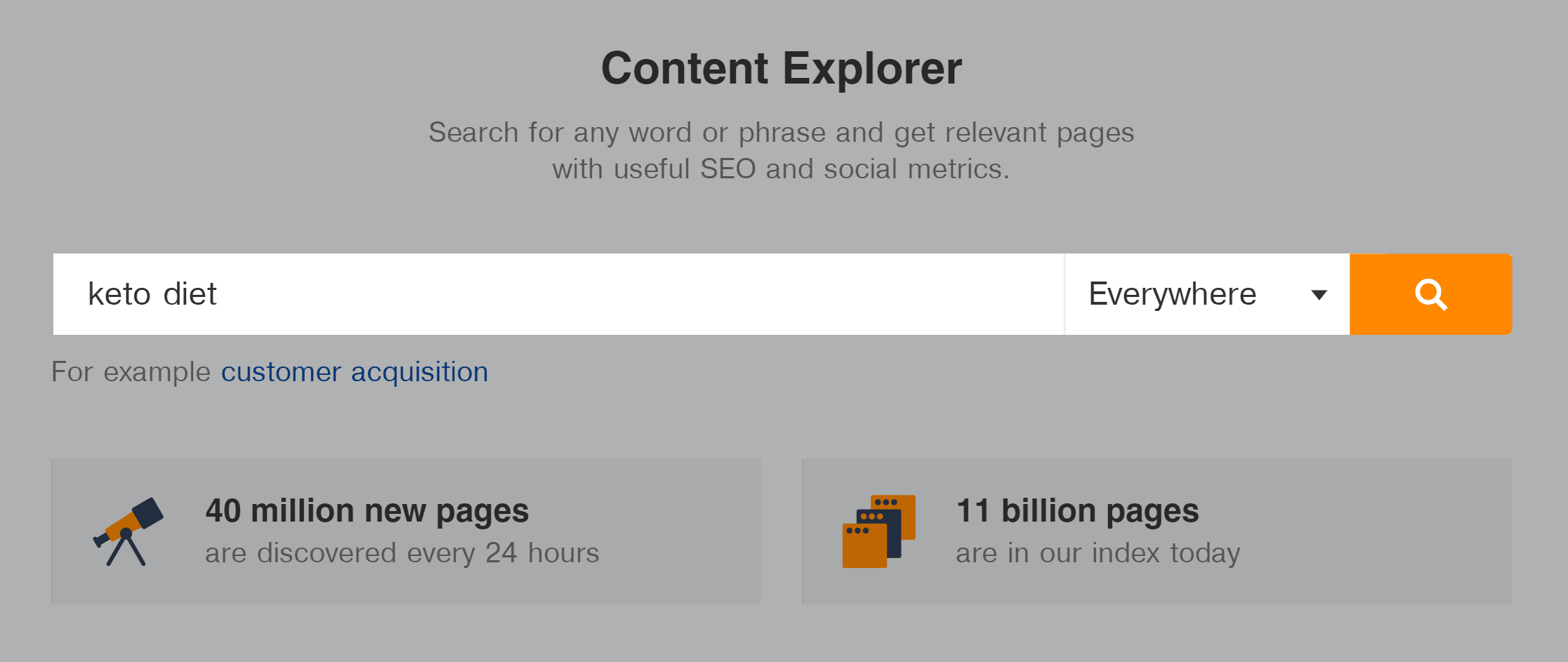
…and see which content has already done well in terms of backlinks, social shares and more.
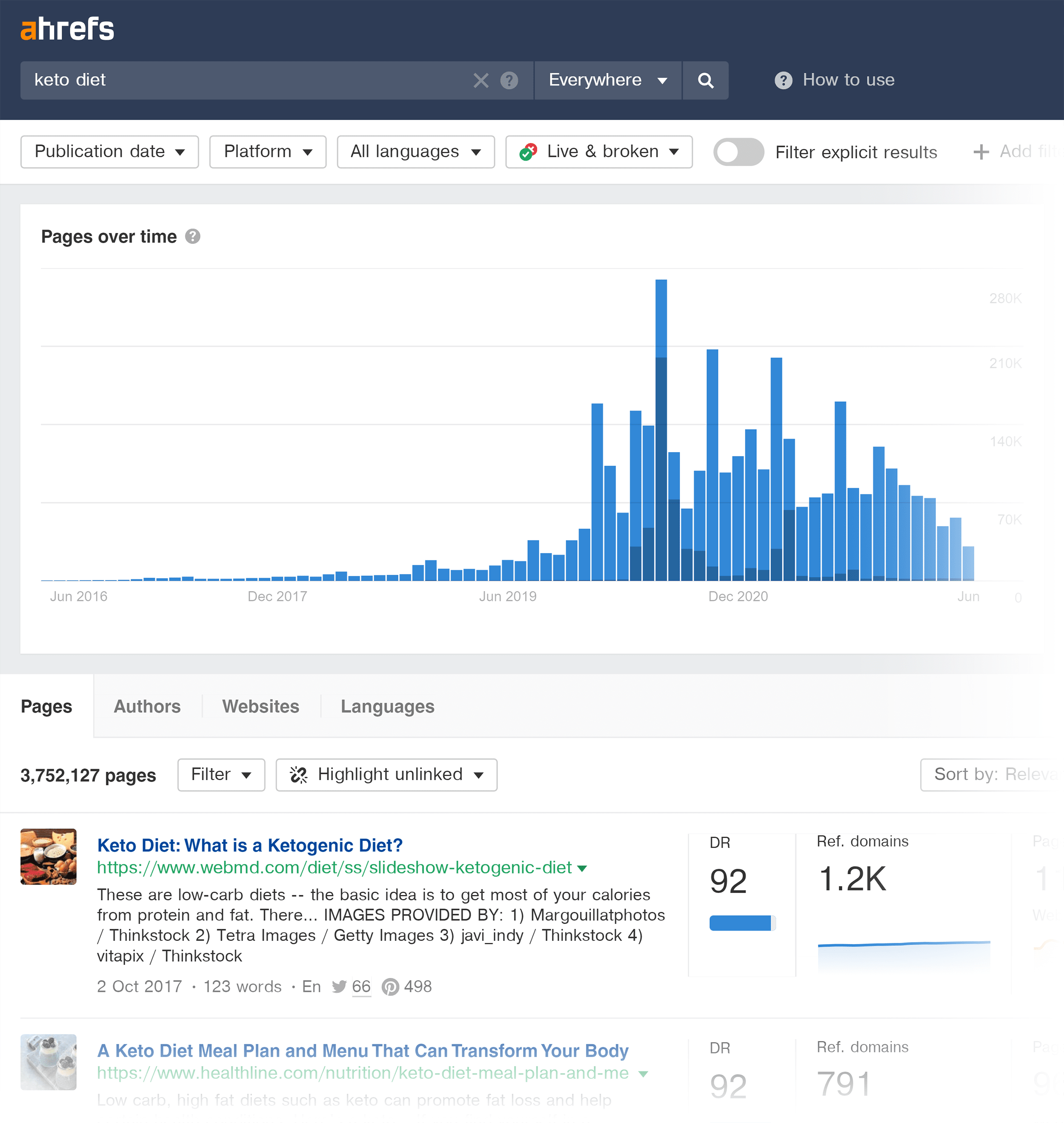
Ahrefs also has a handful of “mini features” that I use all the time… features that few other tools have.
For example, I tend to use Ahrefs for broken link building.
That’s because I can EASILY find broken external and internal links in Ahrefs. In fact, this simple feature has saved me dozens of hours.
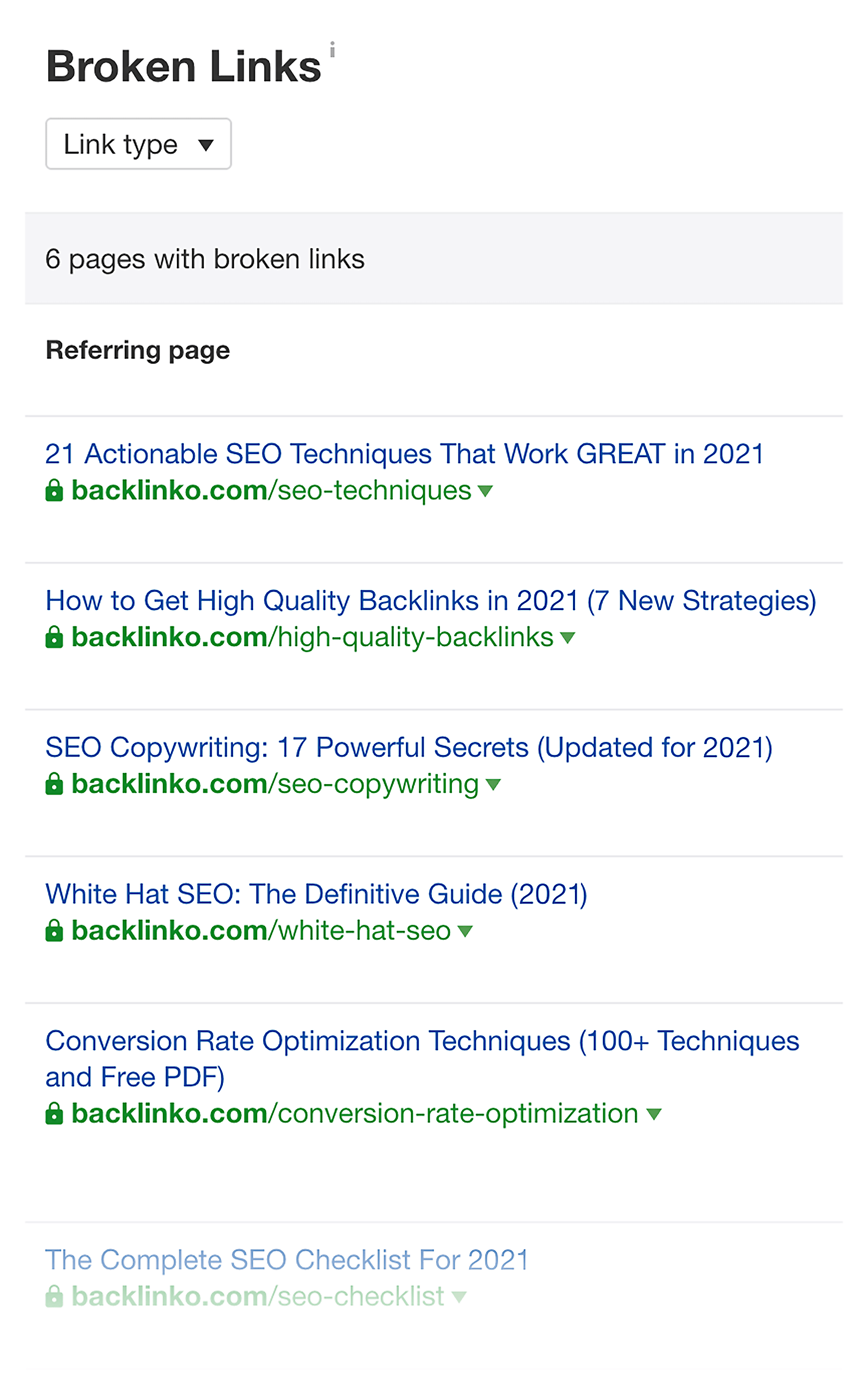
I have to say Semrush is the overall winner in the “cool feature” department. Honestly, both Ahrefs and Semrush have unique features that no other tool has. But Semrush’s unique features (especially their full-fledged PPC software) are a must if you’re running Google Ads campaigns along with SEO.
Which Tool Is The Best Overall Value?
Now it’s time for the question that’s probably on your mind:
“Which tool is going to give me the most bang for my buck?”.
Obviously, this depends A LOT on what’s important to you. And what you work on most.
For example, if you spend most of your day link building, you’ll appreciate that you can find what you need in Ahrefs relatively quickly.
But if you’re an agency that does PPC,SEO and content marketing for clients, you’ll love that Semrush combines PPC and SEO into one tool (and monthly fee).
With that caveat out of the way, here’s how the pricing for each tool breaks down.
Semrush pricing is fairly straightforward ($139.95-$499.95… with an enterprise plan that depends on needs).

You can use most of the main features of Semrush with a $139.95 “Pro” plan (like backlink analysis and keyword research). But you can’t get access to certain other features like historical data.
If you pay monthly, Ahrefs ranges from $29 all the way up to $449.

Unfortunately, Ahrefs switched over to usage-based pricing. Which makes comparing their pricing to Semrush a little more complicated.
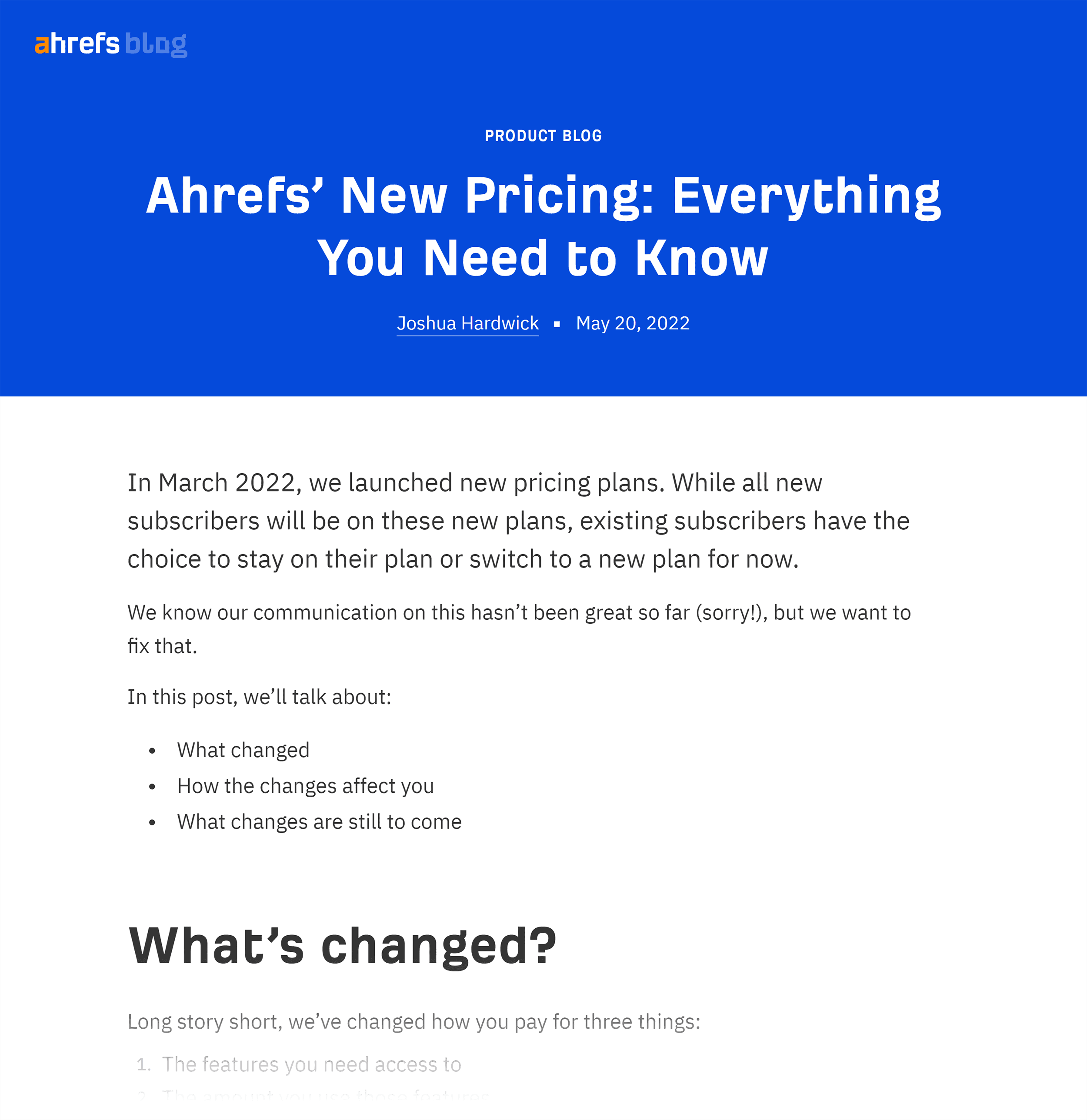
Ahrefs used to have a straightforward pricing model: if you signed up to Lite, you got featured in Lite. If you signed up to Advanced, you got the features in Advanced. That’s how most SaaS plans work.
But out of the blue (literally announced as “effective from today”), Ahrefs switched over to usage-based pricing.
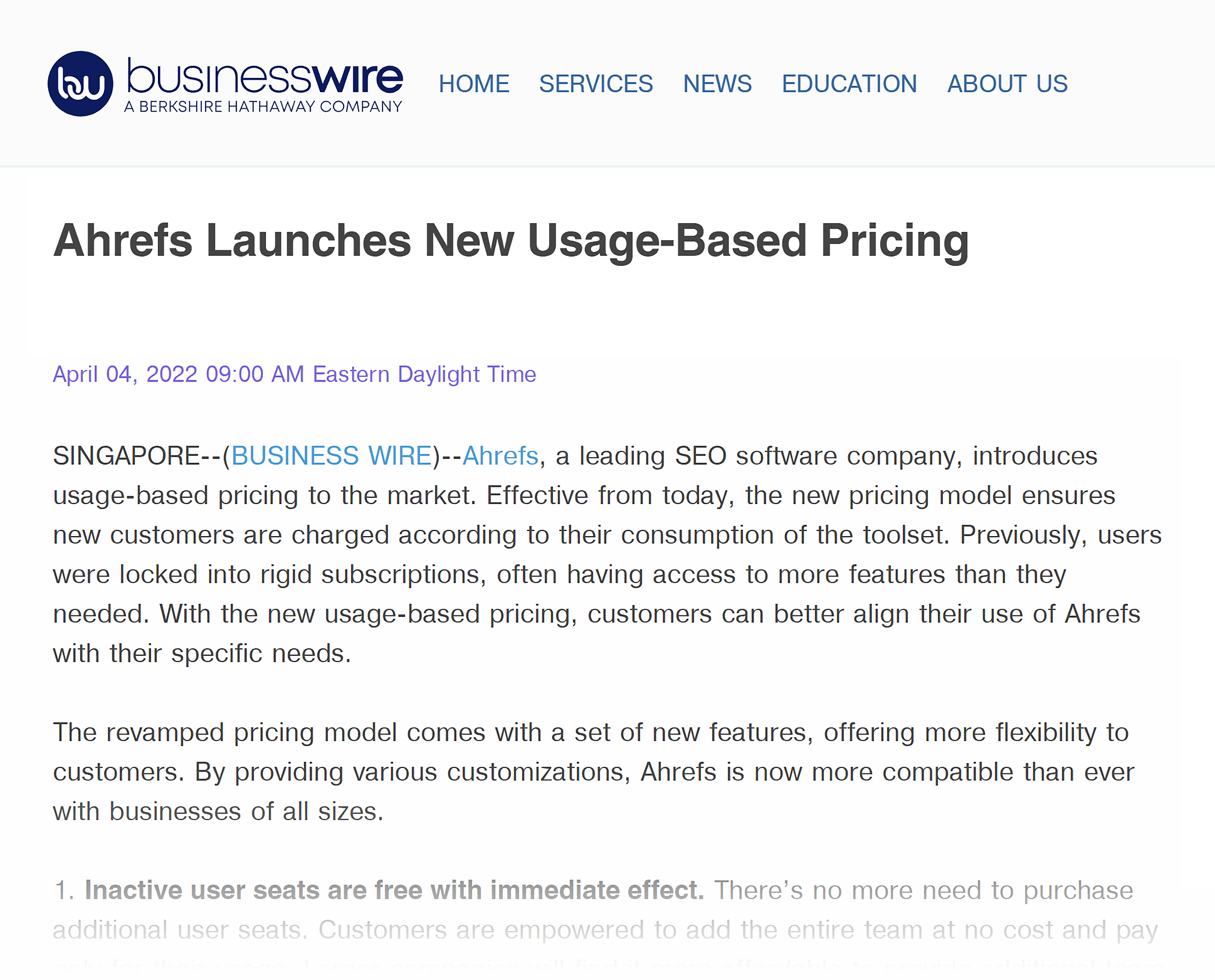
On the plus side, legacy users like myself can stick with their more straightforward pricing model. But this isn’t an option for new customers.
Also, as a legacy user, I don’t get access to new features until I switch over to usage-based pricing. Which is… not great.
In fact, this pricing change has caused quite a bit of frustration among many of Ahrefs’ most loyal users.
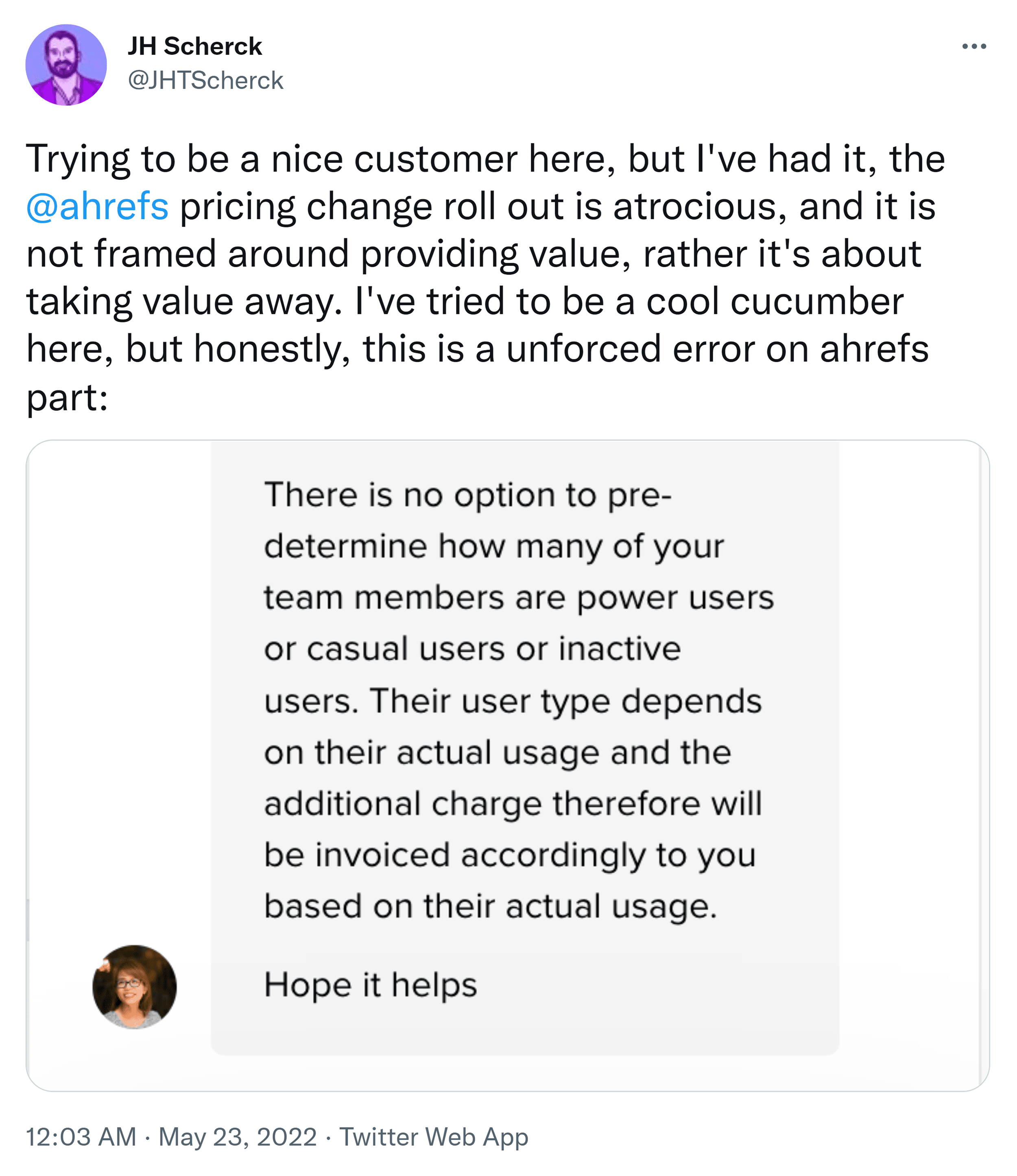
When it comes to pure value, Semrush wins. That’s mostly because you get a fully-featured SEO software suite AND Google Ads software for the same monthly price. Not to mention a simple pricing model that just makes sense.
Semrush vs. Ahrefs: And The Winner Is
I’ve personally used both tools since 2012. I happily pay for each tool every month because I think they complement each other well.
So to come up with a winner, I took lots of factors into account:
- Link features
- Keyword features
- Value
- Support and documentation
- New feature updates
- Bugs and problems
- Overall value
But if you had to make me pick ONE tool to use for SEO, I’d have to go with Semrush.
This was a REALLY hard call to make. I honestly think you can’t go wrong with either tool.


